Alumni, Students, Staff and Community Tell Their Falcon Stories



Alumni, Students, Staff and Community Tell Their Falcon Stories


UWRF students spent countless hours in Hagestad Student Center when it was the ultimate campus hang out – a bookstore, a bowling alley and home to Brandy’s, a tavern and music venue. That was 1959. The building (renamed Hagestad Hall upon completion of the new University Center in 2007) was torn down this summer, soon to be replaced with the new Science and Technology Innovation Center (SciTech). See page 8 for the latest on this exciting campus project.
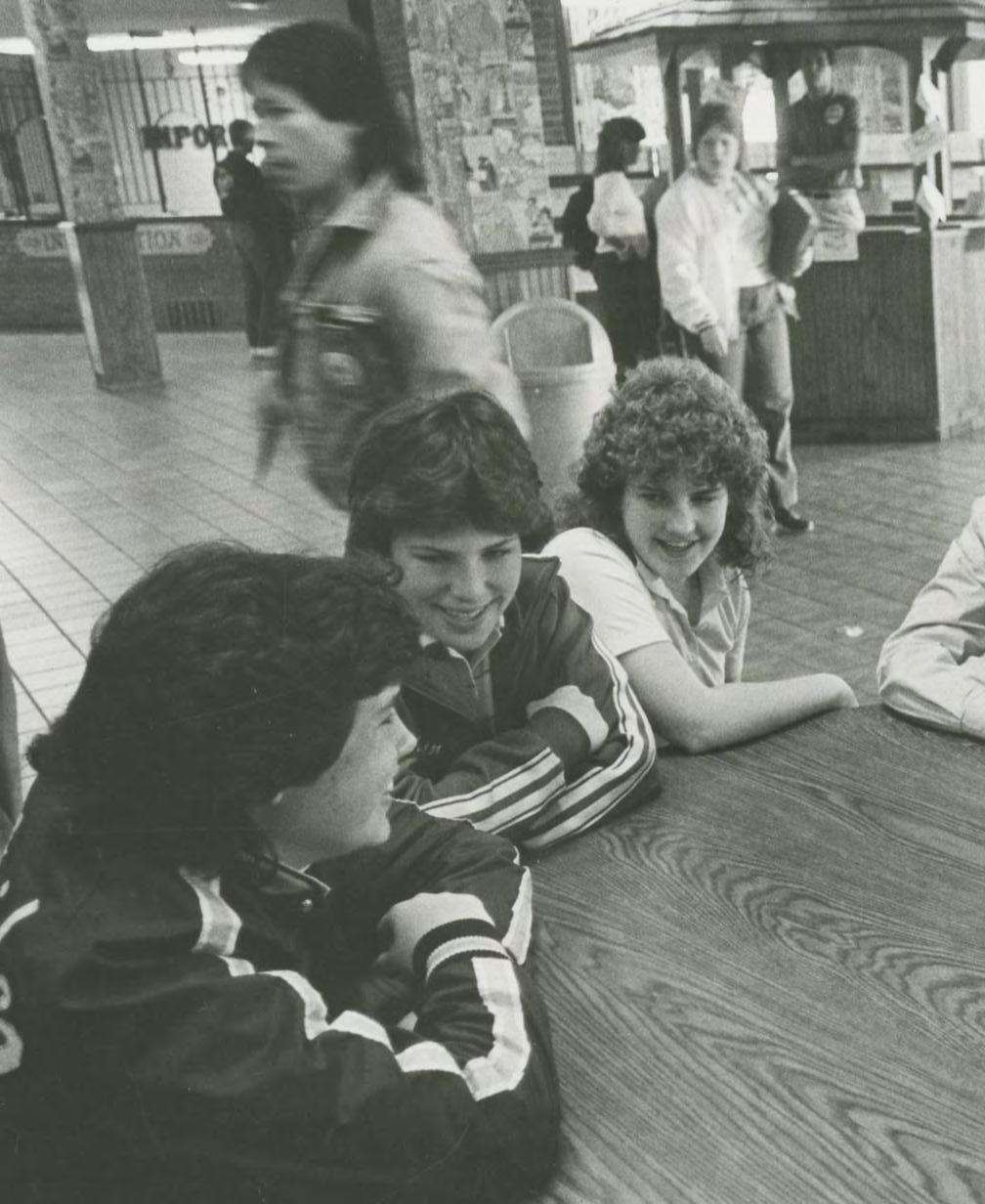

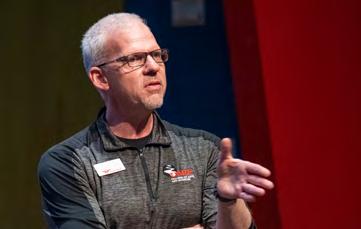
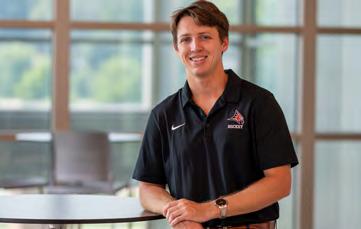
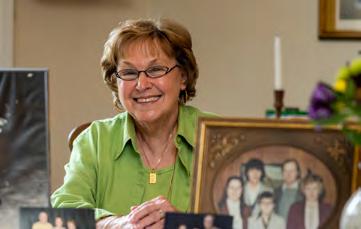

Prior to starting work as chancellor at UW-River Falls in the summer of 2021, I lived and taught at locations across the U.S. I grew up in New York and for 16 years taught and conducted research at the University of Florida, where I was chair of the Agronomy Department. I then moved to the University of Hawaii, where I was dean and director of research plus cooperative extension at the College of Tropical Agriculture and Human Resources. Next, I moved across the country again, this time to work as president of Delaware Valley University.
But I’ve really found my home at UWRF.
I was drawn to the university’s strong STEM (science, technology, engineering, and math) programs, including agricultural sciences, and the university’s commitment to student success. However, it was the warm reception I received from university faculty, staff and the surrounding community during my initial visit to River Falls that sold me on this institution. Right away, the Falcon community made me feel comfortable.
I got my first taste of the Midwest in the early 1990s, when I was a research faculty member at the University of Minnesota. I loved the region then, and I knew I would cherish being back. My biggest challenge living here? It’s cheering simultaneously for both the Green Bay Packers and Minnesota Vikings. When they play each other, I simply want a good game.
Today this place is home – it’s just that simple. I am grateful to be a member of the Falcon family and play a small part in the history of UWRF. Our faculty and staff are dedicated experts and are sincere about their desire to educate all our students, and that is what higher education is all about. My parents used to tease me and say, “you went to school and you never left.” They are right. This is my passion, and this is my place. Go Falcons!
Sincerely,
MariaAssistant Chancellor University Advancement
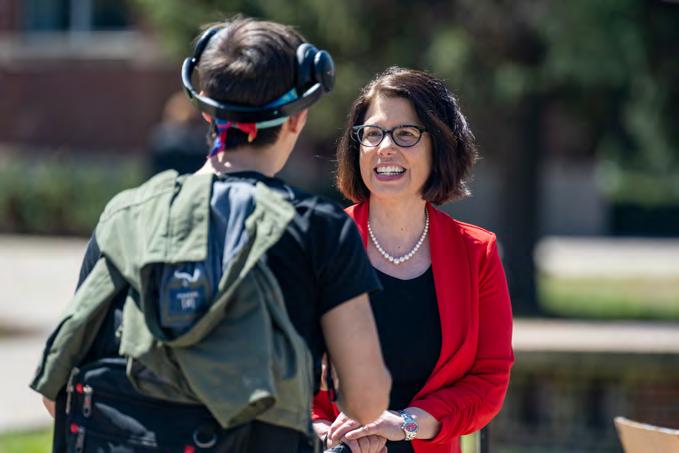
Rick Foy
Executive Editor

Dina Fassino
Creative Manager
Tony Bredahl, ’86
Copy Editor
Deb Toftness
Feature Writers
Julian Emerson
Trent Jackson
Eric Lindquist
Photographer Pat Deninger
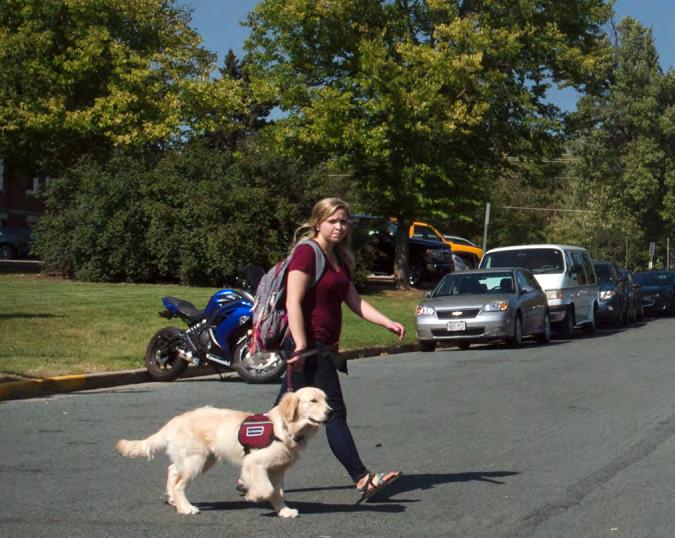
The University of Wisconsin-River Falls is home to four-legged learners this fall as dogs are paired with students in a service animal training program that is now part of UWRF’s curriculum.
Twenty-two students are helping train 10 dogs as part of the Falcon Fostering Education Through Campus Hosting (FETCH) program operated in conjunction with Can Do Canines, a service dog training business based in New Hope, Minn. A similar program called Assistance Dog Education Program and Training (ADEPT) was started at UWRF in 2016 and is no longer associated with the university.
Chris Hergenrader, animal science assistant professor who started Falcon FETCH, said he is especially excited about the new program because it will benefit not only dogs and the students who train them, but people who rely on service animals as well.
Students stay in Stratton Hall with the dogs that are being trained, with much of the training taking place at the Lydecker Living Learning Center on campus. Some other universities, including the University of Minnesota, partner dogs with students to provide service dog training, but few have incorporated that effort into a living and learning community and actual coursework focused on service dog training as is the case at UWRF, Hergenrader said.
Dogs in the program are between nine and 18 months old. They will be trained at UWRF for different lengths of time, depending on their age, he said.
Working with service dogs gives students involved in Falcon FETCH valuable experience that can lead to jobs, Hergenrader said.
Gay Ward, a retired University of Wisconsin-River Falls teacher education professor who founded the university’s Montessori Program and has received numerous awards, was honored with yet another accolade this year.
Ward, who taught at UWRF from 2001-15, received the American Montessori Society (AMS) Living Legacy Award, given for a lifetime of dedication and service to the society and advocating for the Montessori method of education. She started the UWRF Montessori Program in 2012.
Ward was honored for the award and her past accomplishments in education at a May 6 reception at UWRF. She said she was surprised to receive the honor and praised her colleagues at UWRF and the other places she has taught with helping her find success.

“This award is for us. It’s for our whole program,” Ward said of the UWRF Montessori Program. “None of this happens without the collaboration of a lot of people.”
Ward has left a significant footprint on the Montessori movement around the world. In addition to teaching in Australia and the U.S., she has presented at and taught in AMS programs in South Korea, Taiwan and throughout the U.S. and has played a leadership role in Montessori organizations in Australia. She has led numerous AMS committees and played key roles in many national Montessori research efforts.
Ward continues to advocate for Montessori because of her strong belief in the education method named for Italian physician and educator Maria Montessori. The method emphasizes handson learning, developing problem-solving and critical-thinking skills, and both independent and collaborative learning. She is working to include Montessori-style learning in more schools.
“I get such a thrill out of doing this work,” Ward said. “This work excites me, and I will do this until I die. There is nothing else I would rather do.”
For the second consecutive year, a University of Wisconsin-River Falls graduate has earned a Bush Fellowship.
Alexander Leonard, a 2017 graduate of the UWRF masters in school counseling program, was named a 2023 Bush Fellowship recipient for his commitment to helping students who struggle in school find academic success. Kaltun Abdikarani, a graduate of the same program, received the honor in 2022.
Leonard was one of 24 recipients chosen from nearly 500 applicants from Minnesota, North Dakota and South Dakota. He and other award recipients receive up to $100,000 to pay for 24 months of study to build leadership skills.
Leonard is co-founder of the innovative Community Connected Academy at Patrick Henry High School in Minneapolis. Students who are part of that program have experienced remarkable success, with 99% of them graduating.

“The goal is to get students doing hands-on learning and having a voice in their learning,” Leonard said, noting students explore career options. “Our whole thing is ‘Let’s get you out and see if you really have an interest in that (profession).’”
Despite his success, Leonard is leaving his high school counselor job. He will spend his time as a Bush Fellow studying ways to keep Black and Brown teachers in their profession, and he plans to work in the future on that endeavor. Doing so will involve addressing racial trauma and finding ways to heal past damage and build resilience, he said.
“The work I want to do is to help Black and Brown educators find a way to heal the racialized trauma that is a part of them,” Leonard said. “I want to help them find a better way to deal with that. Doing that work could be one good way to help retain those staff members.”
The University of Wisconsin System’s oldest training program in the agricultural sector, the Farm and Industry Short Course (FISC), is moving to UW-River Falls in the fall.
FISC began on the UW-Madison campus in 1885 as a way for scientists to share their findings with farmers during the dormant winter season so new
practices could be applied in the following growing season. Earn college credits that can be used at UWRF or transferred.
The UWRF’s College of Agriculture, Food and Environmental Science (CAFES) well known nationally for outstanding education in a broad range of agricultural fields with expertise in dairy science, animal science, plant and earth sciences, ag business, ag engineering, and food science is wellpositioned to take the lead in offering the program and meet the needs articulated by dairy industry leaders.
The focus of FISC is on dairy farming, specifically the fundamentals of managing cows and calves, with additional education on topics such as nutrition, dairy techniques, mastitis and milk quality, and dairy record keeping.
The university’s dairy farm is 10 minutes from campus and the dairy and meat processing plants are on campus itself, providing students with numerous hands-on learning opportunities.

With a very active Dairy Club on campus, in addition to other student organizations, UW-River Falls offers an environment where FISC students can thrive, develop mentor relationships and professional networks.
FISC students will live together during the 16-week residential program that runs Oct. 25, 2023-March 15, 2024. Classes will be taught by UWRF faculty during the first eight weeks of the course. Then, during the winter term in January, UW-River Falls will collaborate with UW-Madison and UWPlatteville to instruct students. Students will continue their coursework at UWRF for the first half of the spring semester until the course ends.
Learn more about FISC and the world-class agriculture training opportunities available to students at UW-River Falls at https://www.uwrf. edu/academics/fisc.
The UW-River Falls dairy pilot plant received a key component of the plant’s renovation efforts this summer that will enhance students’ education and better prepare them to work in the dairy industry.
On June 30, UWRF received a high temperature, short time pasteurizer (HTST), equipment that will significantly increase the amount of milk that can be processed into cheese and other dairy products at the university’s on-site dairy plant. The renovated plant, now known as the Wuethrich Family/Grassland Dairy Center of Excellence, will provide teaching and training opportunities that will offer participating students high-quality, hands-on instruction. The plant’s grand re-opening is set for Friday, Oct. 20.
UWRF is one of only a few campuses in the U.S. that provides students with the opportunity to work in a dairy plant setting and be involved in all aspects of the industry, from testing to production to marketing.
The new pasteurizer is key to the dairy pilot plant’s modernized operations and has been in the works for four years. Michelle Farner, director of dairy production at UWRF, and others have eagerly anticipated its arrival.

“This is huge, not only for our university but for the dairy industry and for Wisconsin,” Farner said. “This is what makes our whole plant go, and it’s a relief to finally have it here.”
UWRF’s School of Business and Economics introduced a Master of Science in Business Analytics (MSBA) program for fall 2023. The new program has been thoughtfully developed by faculty over the past couple of years with the focus on understanding and meeting the needs of the marketplace as organizations of all sizes seek to harness the power of data to drive their businesses forward.
The MSBA is a collaboration among several disciplines within the school. The launch of the new program also provides an opportunity for current and prospective students to pursue dual graduate degrees in the MSBA and legacy MBA program. The school continues to be committed to supporting the needs of students and employers alike and looks forward to additional growth.
Full-time students can complete the 30-credit graduate degree program in one year, or two years if part-time. The program’s online, eight-week course format allows for flexibility, recognizing the busy schedules of business professionals.
For more information, email Program Director Leanne Van Allen at leanne.vanallen@uwrf. edu.
Campus transition signals a new era teaching and learning at UW-River Falls
The demolition of one of the oldest buildings on the UWRF campus is making way for the newest. Hagestad Hall served students for over 65 years in various capacities, from the student center to the bookstore to the Ratheskeller to the bowling alley and more.

There will be little time for the dust to settle on the deconstruction of Hagestad as September marked the start of the construction on the university’s new Science and Technology Innovation Center (SciTech). SciTech construction will continue through summer 2025. Follow the construction progress via livestream at SciTech Live
SciTech’s ceremonial groundbreaking is set for Monday, Oct. 23. Technology, furniture, and lab equipment will be installed in fall 2025. The target date for project completion, grand opening and inaugural classes is January 2026.
SciTech will be a transformational facility, prominently
located and easily accessible on campus, where students from a wide range of majors will engage in immersive high-impact learning experiences in biology, chemistry, physics and psychological sciences.
In addition to providing UWRF faculty and students with a transformational learning environment, SciTech is being built with business and industry leaders and entrepreneurs foremost in mind.
The center will actively engage business and community partners in discovery, innovation and talent development at UW-River Falls. It will provide entrepreneurs and businesses access to spaces for making, discovering, and cooperating in STEM fields and beyond, bringing together industry and university resources to support new business expansion and economic growth in the rapidly growing St. Croix River Valley region.
For more information on how you can be a part of SciTech’s success, visit https://www.uwrf.edu/SciTech/
A University of Wisconsin-River Falls effort that is the first-of-its-kind in the nation training meat industry workers to treat animals more humanely when they’re slaughtered is playing a vital role in expanding and upgrading Wisconsin’s meat processing sector.
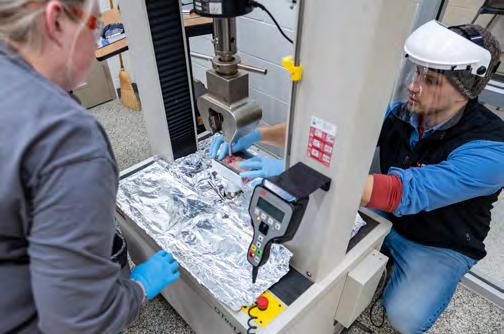
The UWRF Humane Handling Institute (HHI) provides hands-on learning for students seeking to work in the meat processing industry. HHI is expected to boost Wisconsin’s meat processing capability after meat supply chain issues occurred during the coronavirus pandemic, leading to long butchering wait times for animals and a meat shortage at grocery stores.
Kurt Vogel, professor of Animal Welfare and Behavior who leads the HHI effort, said the program will improve animal slaughter procedures and meat processing safety practices while boosting consumer confidence in meat. A growing number of consumers are concerned about how animals are treated as part of processing, he said.
“My goal is to get to a point where we don’t have humane handling enforcement actions because handling animals that way has become the standard,” Vogel said.
The UWRF College of Arts and Sciences (CAS), College of Agriculture, Food and Environmental Sciences (CAFES) and newly established College of Education, Business and Allied Health (CEBAH) welcomed new deans in this past summer.

HHI is a partnership between UW-River Falls and the Wisconsin Department of Agriculture, Trade and Consumer Protection and is funded by Gov. Tony Evers’ $5 million Meat Talent Development Program. Participants learn about humane pre-slaughter handling, transportation, stunning livestock, and proper equipment maintenance. HHI staff have recently begun training Wisconsin small- and medium-size meat processors in humane handling procedures.
In June, Michael Orth was named CAFES dean following the retirement of Dale Galenberg who served in that role for 16 years. Orth had been a faculty member at Texas Tech University in the Department of Animal and Food Sciences, where he also served as department chair for eight years. Prior to that he was a faculty member at Michigan State University. Throughout his career he has been active as a researcher on livestock species and has been a dedicated service provider to his profession, including serving as an officer for the National Block and Bridle organization for 11 years with the last three as president.
New CEBAH Dean Chishty comes to UW-River Falls from Fort Hays State University in Hays, Kansas, where he was dean of the Robbins College of Business and Entrepreneurship and a finance professor. Prior to that, he served as a faculty member and also in a variety of administrative positions including interim dean of the Graham School of Management at Saint Xavier University in Chicago. Chishty earned his B.A. in political science (1984) from Williams College in Williamstown, Mass.
New CAS Dean Kisting worked most recently as associate dean of the Pamplin College of Arts, Humanities, and Social Sciences at Augusta University in Augusta, Ga. He earned his B.A. in English and writing from Marquette University (1999) and his Ph.D. in English from The University of Iowa (2007). A specialist in the literature and culture of early modern England, he is also a seasoned administrator who has helped to build a wide range of innovative, interdisciplinary programs ranging from highimpact general education initiatives to masters- and doctorallevel programs.
For Karl Peterson, his career at the University of Wisconsin-River Falls has always been about the students. Whether he is teaching Falcons about the intricacies of organic chemistry as a professor or planning curriculum changes as an administrator, Peterson continues to keep his focus on former, current and future students at UW-River Falls.
“What drives me is the teaching, the interactions with students that I have,” said Peterson, who joined the university’s faculty in 1999. “I love the energy and vitality they have and the optimism and potential they bring.”
To that end, he strives to help students maximize their potential by channeling that energy into something they care about deeply.
“It’s my hope for every student that we help them ignite that fire and bring that passion to the world,” said Peterson, a resident of the St. Croix County town of Kinnickinnic.
Peterson now divides his time between the classroom as a chemistry professor and his duties as associate dean in the College of Arts and Sciences and a member of the project leadership team for the effort to develop a new Science and Technology Innovation Center (SciTech) on campus. Demolition of Hagestad Hall began this summer to make way for the SciTech building, which will have a groundbreaking ceremony this fall and is expected to host its first classes in spring semester 2026.
Peterson’s continuing emphasis on students is not lost on his colleagues.

“Karl’s passion for teaching and student-centric approach to doing his job always helps to remind me why we are here,” said David Travis,
provost and vice chancellor for academic affairs.
Likewise, Chancellor Maria Gallo recognizes and appreciates how Peterson’s approach, both as a professor and administrator, benefits students attending UWRiver Falls.
“Karl’s passion is teaching and engaging with students,” Gallo said. “He has played an instrumental role in bringing SciTech to life. His expertise helped inform its design, which will greatly enhance the educational experience for every student that passes through its doors.”
For his part, Peterson is excited about what the new science building will bring for students as well as what its University and Business Collaboration Center will mean for Wisconsin’s economy through the planned expansion of collaborative projects between UWRF students and faculty and regional and state businesses.
“SciTech is going to be a transformational project for students, faculty and businesses,” he said. “This new, state-of-theart center gave us the platform to propose this change in the way the university intends to interact with regional business partners.”
Peterson, who grew up in Onalaska, said a great experience in his high school chemistry and biology classes sparked his interest in science, which blossomed further when he dove into organic chemistry as a junior at UWLa Crosse. His passion was so strong that he decided to attend graduate school with the intention of teaching organic chemistry in college.
After earning his doctorate in organic chemistry at Iowa State
University, Peterson was ready to launch his teaching career in 1997. But the tight job market for organic chemists wasn’t ready for him. With tenure-track faculty positions in his field few and far between, he elected to accept a temporary teaching position at Mount Holyoke College, a private women’s institution in Massachusetts.
Peterson spent two years gaining experience at Mount Holyoke and then sought to return to his roots in the Midwest.
After applying for an organic chemistry faculty position at UWRiver Falls, he visited River Falls for an interview and was smitten by the campus, the people and the community.
In particular, he loved the idea of living in a small town just two hours from his hometown and half an hour from all of the big city amenities of the Minneapolis-St. Paul metro area just across the St. Croix River.
“The location in the beautiful St. Croix Valley was perfect,” Peterson said. “I thought, ‘What a wonderful place to put down roots.’”
Perhaps even more important was the match between UWRF’s philosophy and Peterson’s professional priorities.
“The student-centered nature of the institution is key, so that goes back to my interest in getting into teaching in the first place,” he said.
“Other institutions have different expectations for doing scholarly work. At UW-River Falls, when it comes to research, we are expected to integrate undergraduates into that scholarly work.”
Even after 24 years on campus, Peterson said, “It’s a perfect fit for my professional goals.”
Upon his arrival, Peterson worked
solely as a faculty member for 10 years before serving as chair of the Chemistry and Biotechnology Department for eight years. But with the department chair spending only a quarter of his time teaching, Peterson longed for more time in the classroom. He accepted a position as associate dean in the College of Arts and Sciences in part because it enabled him to divide his time evenly between teaching and administrative duties.
“That fit me better because I got to spend more time with students,” said Peterson, who was honored in 2011 with the Distinguished Teacher Award, the highest award for faculty at UW-River Falls. Peterson stepped up when
asked in late 2022 to expand his administrative responsibilities by serving as interim dean of the college.
“Karl’s leadership during the recent dean transition in the College of Arts and Sciences was instrumental in continuing to move the college forward in numerous ways,” Travis said, adding, “In my time working with Karl, I have grown to appreciate not only how dependable he is but also the breadth of responsibilities he can effectively manage.”
Yet Peterson readily admitted he is thrilled that a new permanent dean, Wesley Kisting, started on July 1 so Peterson once again can spend more time doing what he loves — working directly with students. Peterson confided that some of his friends ask him how, more than two decades after his arrival at UWRiver Falls, he still can get excited about teaching the same stuff. His answer, naturally, refers back to his interactions with students.
“In part, it’s because there is a new group of students every year,” Peterson said. “While the material hasn’t changed that much, the way you engage with the material and the students does change. That’s what keeps it dynamic.”
To illustrate the teacher’s mentality that still guides him, Peterson shared an anecdote from the early years of his teaching career, when someone asked him if he hoped someday to use his science skills to discover a cure for cancer. His response: “I’d get more satisfaction from teaching someone who finds a cure for cancer.”
Those are the words of a teacher who has found his calling —and his place — at UW-River Falls.

Those four words define the UW-River Falls experience for generations of students, faculty, alumni and friends.
UWRF has been a place that turns learners into leaders and allows individuals to take risks, build on their abilities and chart their own journeys. It’s a place where campus and community have come together to work collaboratively to improve the quality of life in the St. Croix River Valley and far beyond. It’s a place that has shaped self-starters and team builders, creative makers and critical thinkers. It’s a place that’s provided Falcons the guidance and support needed to think deeply, work smartly, seize opportunity, build the future and soar to new heights.
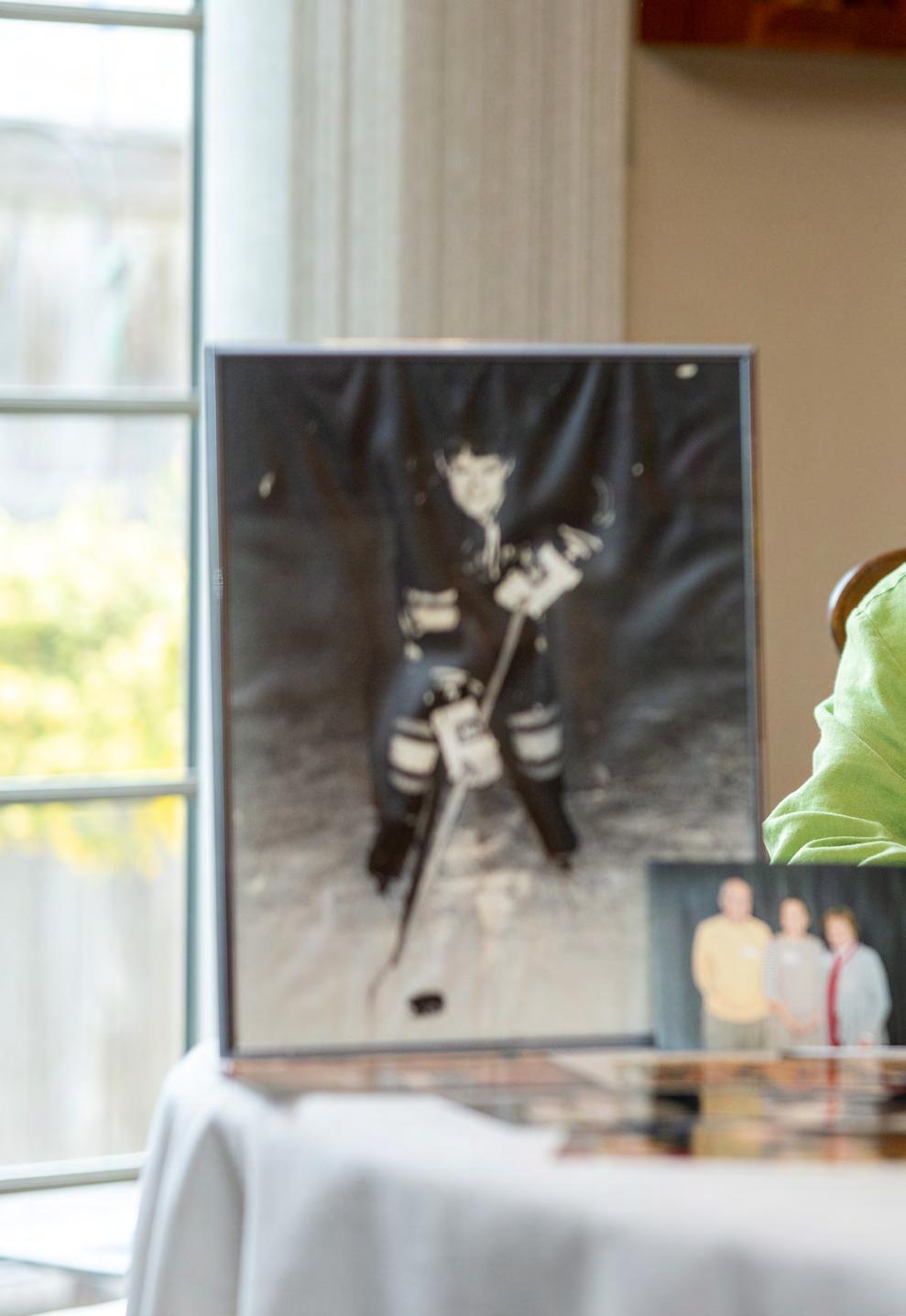
OnJuly 13, 1981, Arline and Scott Taylor received the worst news any parent can get: their 13-year-old son, Shawn, had been struck by a motorist and killed when he was riding his bicycle.
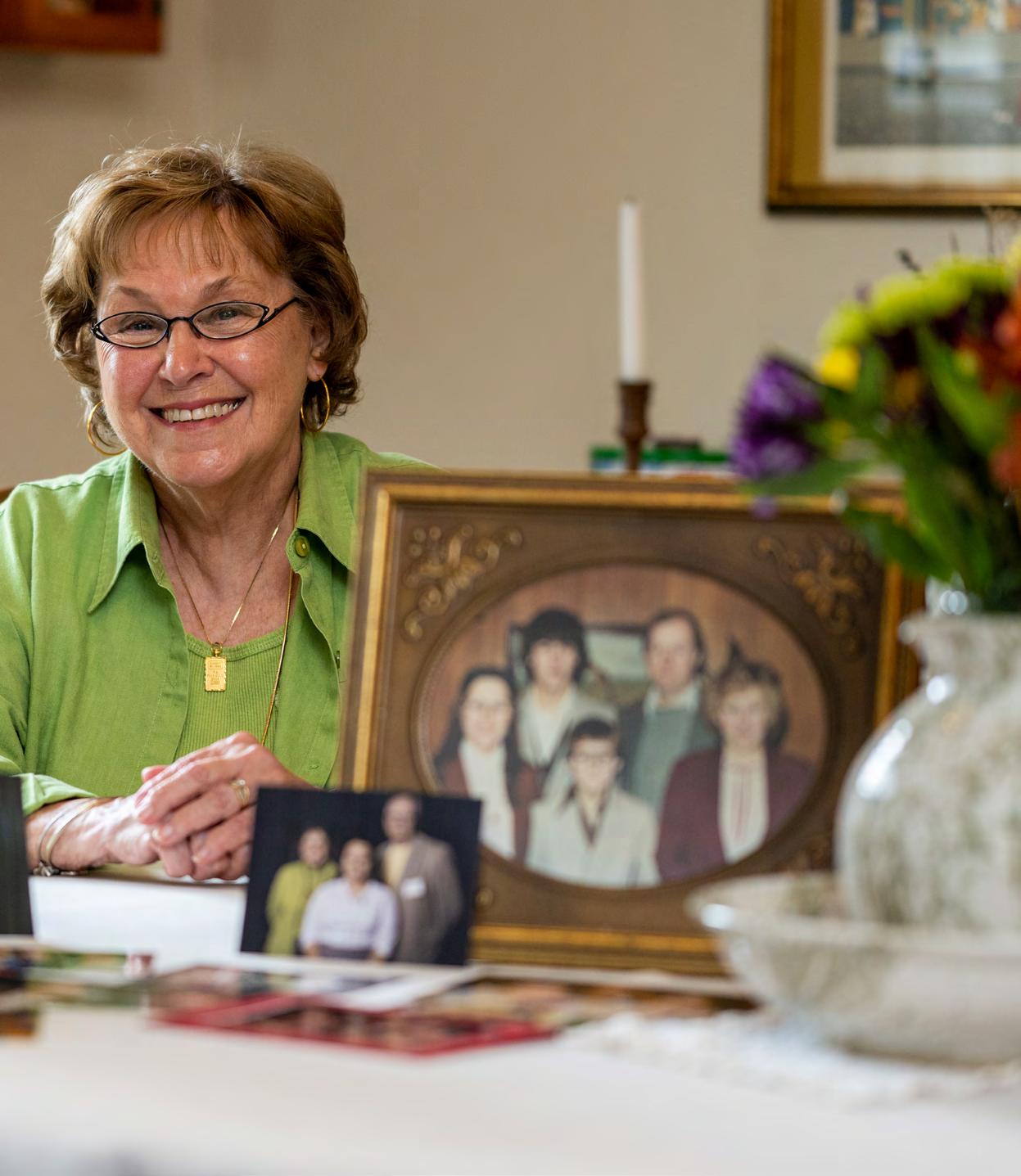
A few days later, community members attending River Falls Days raised $2,500 for the grieving family. The Taylors were humbled by the goodwill donation, but they didn’t need the money. Insurance would cover bills related to their son’s funeral.
The Taylors didn’t know what to do with the unexpected donation. Then a family friend suggested they use it to create a scholarship for a student to attend the university each year.
The Taylors lived on Fourth Street, just a couple blocks from the University of Wisconsin-River Falls, and they spent significant time on campus attending countless events, traversing it on walks and runs, and visiting McDonald’s in the university’s student center. Among the family’s favorite locations was the part of campus where the Kinnickinnic River flows, a spot they referred to as “Pete’s Creek,” named for the property’s former owner. Even though the Taylors did not attend UWRF, the university played an important role in their family, and the couple decided that a scholarship was the perfect way to honor the school and their son.
“Shawn was such a bright light,” Arline said, tears welling in her eyes as she recalled her son 42 years after his death. “We wanted to do something in his memory, and we figured that this scholarship helping students afford school would be a good way to do that.”
More than four decades later, the Shawn Michael Taylor Scholarship at UWRF continues to help students do just that. At first the scholarship provided one student each year with $300 toward schooling, a figure later upped to $500 and then to $1,000. Arline recently decided to allocate another $50,000 toward the scholarship, bringing it to $75,000 in total.
“As expensive as college is these days, I want to help these students be able to afford it,” she said.
Each year she and her husband eagerly anticipated the UWRF scholarship ceremony. They enjoyed meeting the recipient of the scholarship bearing their son’s name and other scholarship winners. They also met new friends among the donor group, Arline said. Scott died in August, but Arline continues to attend the event at which scholarships are awarded.
“Getting to meet these students, it’s been such a joy,” she said. “There are whole groups of people I have gotten to know because of this scholarship. When we set this up, I said we needed to do something for Shawn, to have something good come from his death. I feel like we have done that, and now I want this to go on forever.”
Carroll didn’t arrive at the University of Wisconsin-River Falls as a traditional student, but she credits her time at the university with setting the stage for her successful career.

Dixie
When Carroll enrolled at UWRF in 1989, she was 31 and seeking a fresh start. She had moved from her hometown of Hayward and found her place at the university through tutoring students in math, her major. In addition to enjoying working with students, she developed a rapport with Math Department faculty and staff.
“I was able to find a way to fit in with the people in the Math Department,” Carroll said. “We had a camaraderie. Sometimes it was fun to be with people who were closer to my age than the younger students.”
Carroll graduated from UWRF with a math degree and then took a job at Ameriprise Financial in Minneapolis. She subsequently attended William Mitchell College of Law (today known as Mitchell Hamline College of Law) and passed the bar in 1997. But she didn’t want to work as a traditional lawyer. Instead, Carroll took a job with Ameriprise Financial doing compliance, then later legal work related to insurance and securities regulations.
Most lawyers don’t have undergraduate math degrees, and Carroll credits hers from UWRF with helping her find her career path.
“It served me well to have that math degree,” she said. “It helped me be able to better understand insurance policies and products. I feel that the analytical side of my brain helped me be able to interact with these analytical people, including actuaries, in a more effective manner.”
Calling the work she has done “very challenging, complex and fun,” Carroll said she is thankful for a career she never planned on. Her time as a nontraditional student helped prepare her for unexpected opportunities that broadened her career, she said, noting “I certainly never expected to become a practicing attorney.”
During a recent day on campus, Carroll recalled her college days and fond memories at various campus locations. She retired from Ameriprise in 2022 and established her own business, where she works part time examining insurance companies. She is a donor to the UWRF Math Department and in December 2021 she was named to the University Foundation Board of Directors. She said she has enjoyed rekindling her connections to the university.
“Being here has made me realize how much I have missed this place,” said Carroll, who lives in Maple Grove, Minn. “A lot of changes have happened since I was a student here, and it’s fun to learn about the new programs. It’s like I’m back at school and continuing to learn.”
After a freshman year disrupted by the coronavirus pandemic, Chloe Elftmann questioned where, and whether, she fit in at UW-River Falls. Instead of meeting classmates face to face and living with her peers in residence halls, Elftmann spent most of her first year of college at home with her family in Brooklyn Park, Minn. She returned to campus for her sophomore year still not feeling an emotional attachment to campus.
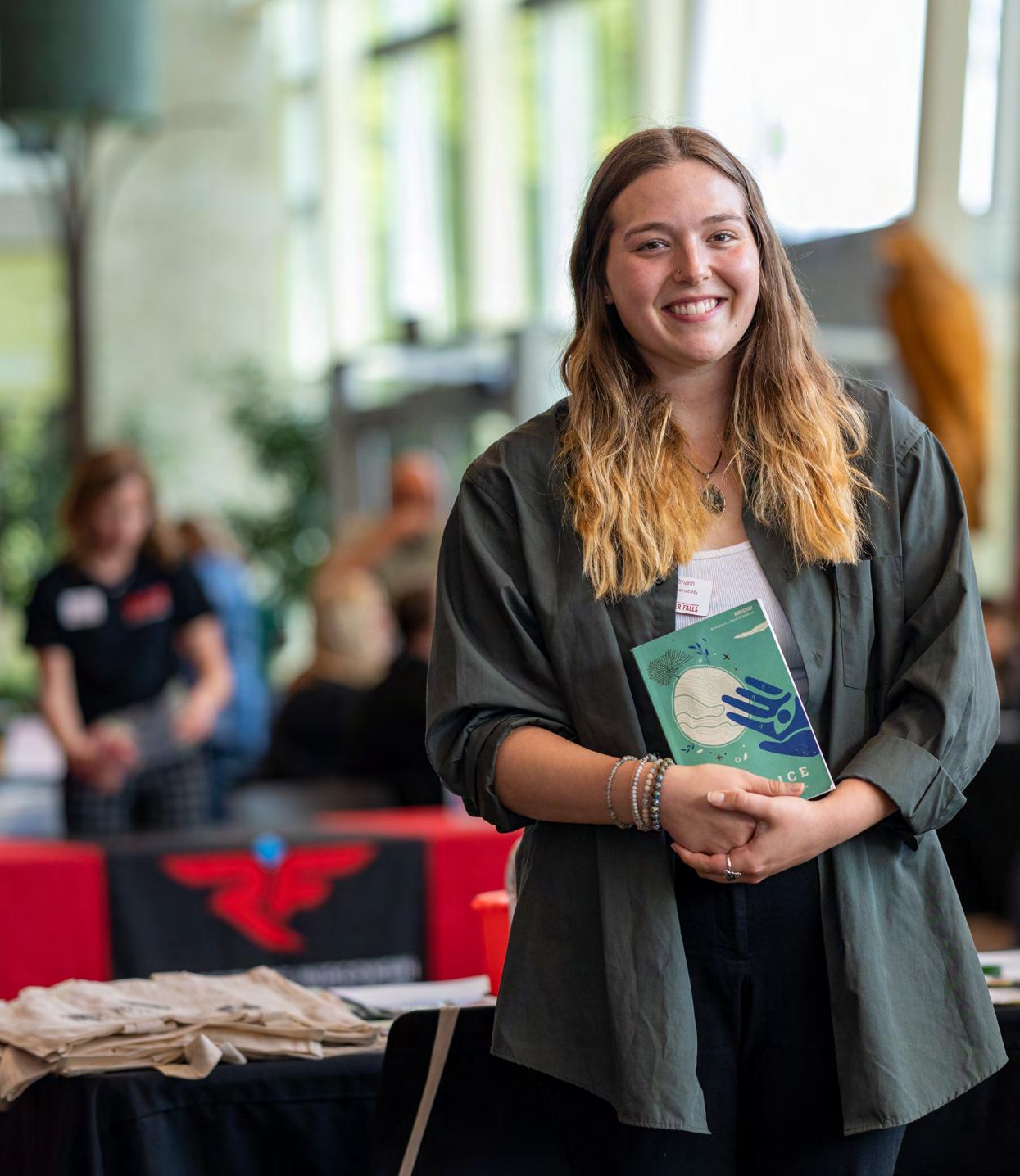
“I was super isolated my freshman year,” Elftmann recalled. “At the start of sophomore year, I definitely didn’t know where to start. The freshmen get most of the attention, with invitations to clubs and that kind of thing. And I had missed out on that.”
Then Chloe took a job at a surplus online auction site in Hagestad Hall. Items from around campus were collected there and sold, part of an effort to divert them from landfills. As she interacted with store patrons and other students involved with sustainability efforts, Elftmann began to feel more engaged. She made friends and became involved with sustainability initiatives on campus such as the Green Team, Bee Club and other activities. She recently helped UWRF be designated as a fair trade university.
“Working for surplus and then being part of the Sustainability Office made me feel like I was part of this campus,” Elftmann said. “It really built up my self-confidence.”
Elftmann didn’t come to campus knowing she wanted to get involved in sustainability. She grew up enjoying nature, but she didn’t foresee studying environmental impacts during her college years. Then she enrolled in a class taught by Sustainability Specialist Tovah Flygare and became increasingly interested in the topic. She learned she enjoys being around others who appreciate the outdoors and taking action to protect the environment. They became her friend group.
“In a way it came out of nowhere,” Elftmann said of her affinity for sustainability. “But I know it’s the right fit for me.”
Elftmann is majoring in environmental planning, with a minor in sustainable justice, and is on track to graduate in December. She worked this past summer as a senior farmers market nutrition program intern for Second Harvest Heartland, helping senior citizens in Minnesota access food. Her future plans include working in sustainability and community involvement. No matter where her future takes her, Elftmann said her experiences at UWRF have instilled confidence and the belief that she can make a positive difference.
“This school and the River Falls community became the right place for me,” she said. “The fact that I have found my home here gives me confidence that I can find my place in the world going forward.”
Afterretiring from her longtime job as a residency coordinator at Regions Hospital in St. Paul eight years ago, Linda Yde looked for ways to reconnect with the River Falls community where she lives.
For Yde, that effort included getting involved with the University of Wisconsin-River Falls. She decided she wanted to resume playing trombone, which she had last done in high school, and she joined the UWRF community band. She enjoyed that so much that she subsequently became part of the university’s trombone choir and pep band.

“I knew when I retired that I wanted to get to know River Falls better,” Yde said. “I wanted to be more active in my community, and being a part of music at UW-River Falls was a really fun way to do that.”
Yde’s love of music allowed her to become involved in UWRF in a deeper way. She has established two music scholarships – the Linda M. Yde Music Scholarship and the Linda M. Yde Athletic Band Scholarship – to enable students to attend the university and study music. Yde said she was motivated to do so after experiencing the joy of performing at UWRF events, including the scholarship donor recognition reception.
“Afterward, as we were walking back to the band room, I said to Tom (UWRF Band Director Tom Barnett), ‘What was that we just played at?’” Yde said of the scholarship awards event. “Then I said, ‘You know what, I should do that.’”
In 2021, Yde set up another scholarship as well, one even closer to her heart. The Jill Hoffmyier and Samantha Sammons Memorial Scholarship is named for Yde’s daughters, both of whom are deceased (Jill died in 1987, Samantha in 2019). The scholarship goes to one student each year attending UWRF who is a nontraditional student, with an emphasis on single moms. Yde was once a young single mother herself.
“I applaud those single moms for going to school and overcoming all of the challenges they have,” she said. “I want to do my part to try to help them do that.”
Doing her part for UWRF and the greater River Falls community has increasingly become part of Yde’s mindset, she said, and has helped her find her place in her post-retirement life.
“The music was something fun I wanted to do, and then it led to the scholarships. That’s how I found my way to fit in,” Yde said. “I’m not rich, but I can help people be able to attend school. That’s one way I can give back to my community.”
Don Richards’ history with UW-River Falls extends even beyond his 90 years.
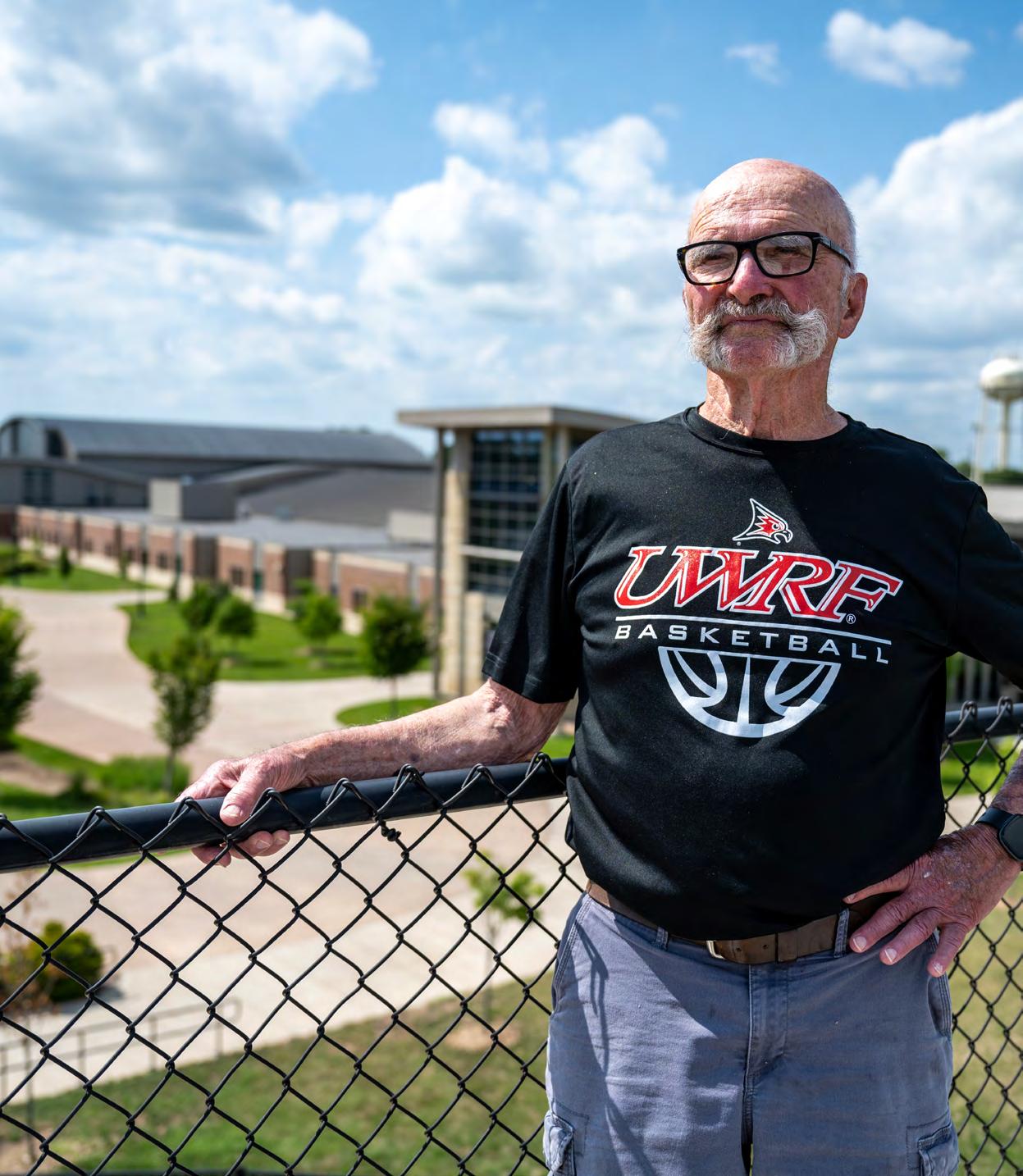
His ties to the university date to 1915-16, when his father, Jim, played on that year’s state championship River Falls State School football team. Richards, a devotee of the history of UWRF athletics, said the team’s championship season predates the Wisconsin Interscholastic Athletic Conference (WIAC) that UWRF has been a member of for decades.
“It’s pretty neat to see the photo of that team and to think about my dad being a part of it all way back then,” Richards recalled, noting that his father later was named a UW System Regent. “In that way, I am rooted to the history of this university.”
Richards, a retired longtime English teacher at River Falls High School and a River Falls native, has maintained a tie to UWRF nearly all of his life. He began watching athletic events at the university at age 10 and has taken in eight decades of sports contests in the years since. He still attends games and writes a sports column for the Pierce County Journal about UWRF teams titled “The Skinny on Falcon Sports.”
“I more or less live and die with the sports teams here,” Richards said.
Richards has other connections to UWRF. He was a member of the university’s Foundation Board of Directors for a number of years and contributed to the Falcon Center for Health, Education and Wellness, built in 2017. He worked with the university in another way during his time as River Falls mayor from 2004-12, partnering with UWRF personnel to connect the school with the surrounding community. He and his wife, Ellie, contribute to the university in other ways, as well, including scholarship support.
Richards has always valued the importance of UWRF to the St. Croix River Valley, and that became even more evident during his mayoral tenure. Without the university in River Falls, the city would be much like others in the region, he said. “But because we have UW-River Falls, we have something special here,” Richards said.
He continues to stress the university’s significance to the community, not only economically but culturally. In fact, Richards said he hopes UWRF can extend its reach into the area, a development that would benefit the university and the region, he said. As an example, he points to former Falcons football coach Mike Farley leading the effort to create the city’s public library.
“There is a real value to having a university in your hometown,” Richards said. “Students from elsewhere graduate from here, and a lot of them stick around because they gain an appreciation for this area. And they came here because of the university.”
Asa teenager who loved hockey, Haley Diggins was determined to continue to play in college, so much so that she was willing to compromise seeking an engineering degree.

But by choosing to attend the University of Wisconsin-River Falls, Diggins (whose last name was Nielsen at the time) not only was able to extend her athletic career, but she gained an education that has led to success in the workplace.
After graduating from Orono (Minn.) High School, Diggins decided to go to UWRF despite the fact it didn’t offer the engineering degree she wanted to pursue. However, UWRF offered strong physics and mathematics programs, and Diggins majored in each.
“It felt like a compromise at the time, but it ended up being a real blessing,” Diggins said of majoring in those subjects instead of solely engineering.
After graduating from UWRF in 2019, Diggins attended the University of Minnesota, where she obtained her master’s degree in mechanical engineering. Connections she made there landed her a job at medical device manufacturer Medtronic’s Minneapolis location. Diggins said her combined degree background gives her a leg up at her workplace.
“Most of my co-workers have a biomedical background,” she said. “Coming from a physics background really gives me a unique and valuable perspective.”
Playing hockey at UWRF provided Diggins with a place to fit in at school, she said, an especially important factor during her freshman year. She roomed with one of her teammates, and team members routinely studied together at the Chalmer Davee Library. Diggins found her footing academically in part because of teammates and other students she met who took their studies seriously, she said. Diggins also praised UWRF faculty, particularly Physics Professor Lowell McCann and Math Professor Bob Coffman, for inspiring her to strive to succeed academically.
“My professors were such big supporters of my hockey career, and our hockey team took academics seriously,” she said. “Being a woman in STEM [science, technology, engineering and mathematics] can be difficult at times … Without [professors] building up my confidence, I don’t know if I would be [at Medtronic] today.”
Diggins found her place at UWRF in another way that positively impacts her future: last summer she married Michael Diggins, whom she met when they attended the university. Four years after graduating, she said she remains close to former hockey teammates and sometimes plays hockey with them.
“The people I am surrounded by today are UWRF people,” she said. “Even four years removed from school, we still are close.”
Growing up on a dairy farm near the small community of Hilbert in eastern Wisconsin, Tim Schneider didn’t envision himself one day growing up to lead one of the state’s largest banks, the culmination of a highly successful career in the financial sector.
“When I look at where I am now and the great opportunities I’ve had, it’s not necessarily something I thought was going to happen back then,” said Schneider, a 1988 UW-River Falls graduate who majored in business.
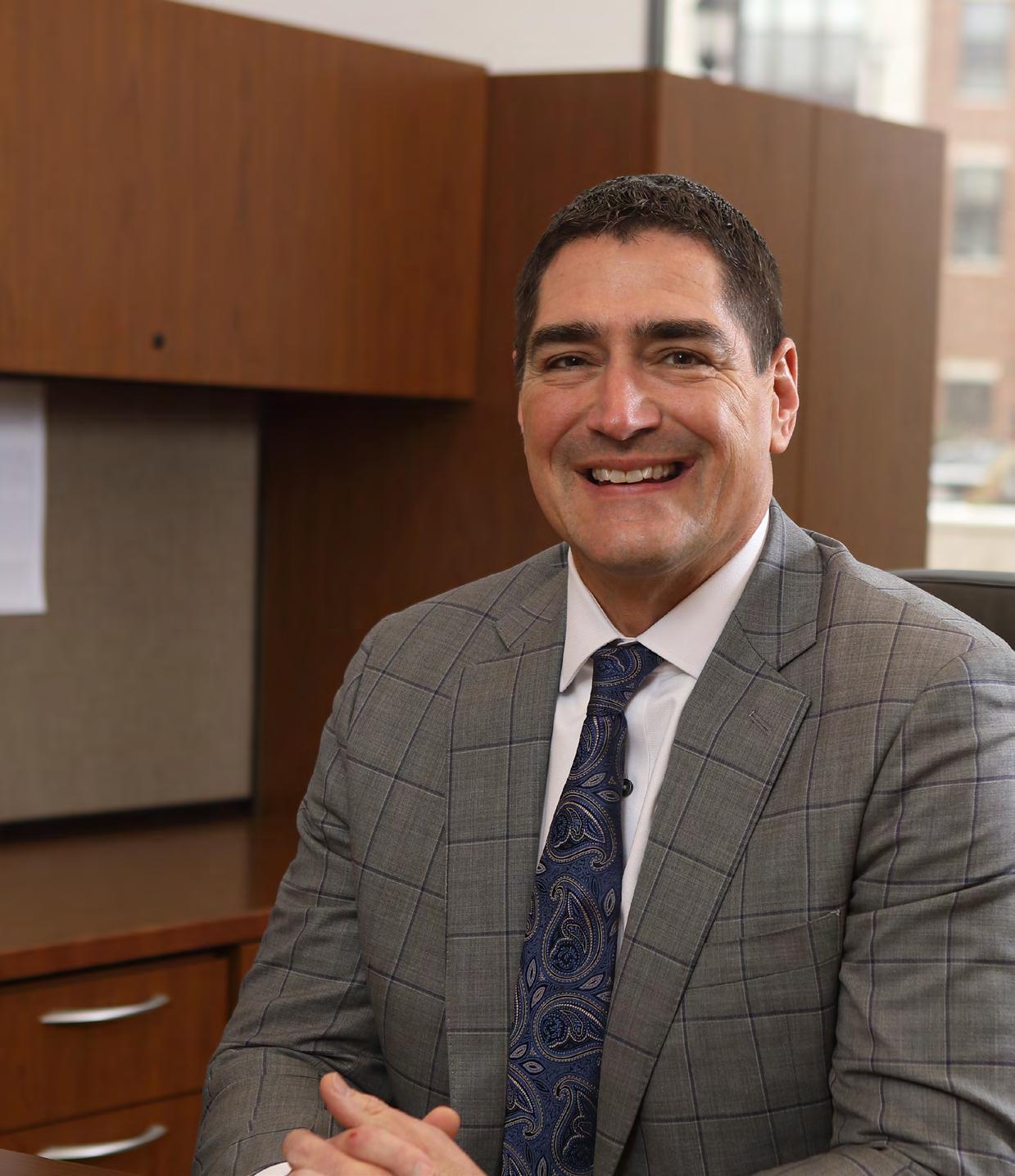
Schneider credits many of those opportunities to his time at UWRF. After graduating in a high school class of 65, he sought a smaller town and college where he could feel comfortable. He found that in UWRF.
Schneider discovered his place at UWRF in another way. He was recruited to play basketball, which he did for one year before switching to football, where he was an all-conference tight end and captained the team his senior year. Being a member of an athletic team helped Schneider get to know people and acclimate to life on campus, he said.
“Moving away from home was an adjustment for the first while. I was a little lonely,” Schneider recalled. “But I made a lot of new friends through sports. That helped me adjust to college fairly quickly.”
Sports had always been an important part of Schneider’s life, and he credits the work ethic he learned growing up on a farm and under longtime Falcons football coach Mike Farley with preparing him for life after college. The lessons Farley, other coaches and his professors once taught him continue with Schneider to this day, he said.
“I still fall back on those lessons,” he said. “The work ethic and leading by example that I learned are very important in a work environment.”
Schneider has put those lessons to good use. He worked in numerous banking positions before joining with three other bankers to form Investors Community Bank, which specialized in loans to farmers and others in the agriculture sector. In 2021, they sold that bank to Nicolet National Bank where Schneider worked for 10 months leading its agricultural division before, in September, becoming CEO and president of Bank Five Nine in Oconomowoc, one of the top 10 banks in Wisconsin in terms of assets. Schneider had led Investors Community Bank before its sale, and he decided he wanted to lead another.
“It’s been a perfect fit,” he said.
Schneider still has ties to UWRF. His brother Chris attended school here, and his daughter Tori, 28, graduated from UWRF with a journalism degree. He still makes it back to campus each fall to take in a football game with friends.
“I still feel very passionate about UWRF,” Schneider said. “The things I learned there continue to help me today.”
Keita didn’t expect to wind up at UW-River Falls. A graduate of Blaine (Minn.) High School, she hoped to attend a large university with a strong food science program, somewhere like the University of Minnesota-Twin Cities, Purdue or Iowa State.
But fate had other plans. Her choices narrowed to UW-River Falls and South Dakota State. The coronavirus pandemic prompted Keita to attend school someplace close to home where she could still get a good food science education. UW-River Falls was her choice.
“At first in the college application process, I was pretty sure it wasn’t the place for me,” Keita, a Coon Rapids, Minn., native who is on track to graduate next year, said of UWRF. “I wanted that big city life. And this is a smaller campus in a smaller town. But it has all worked out for me. I really like my situation now.”
During her three years at UWRF, Keita has found her place. She joined the Black Student Union and then became president of the organization. She became a senator in student government. She got involved with the campus Food Science Club and the First Year Experience Program. Keita is also a member of the Chancellor’s Student Ambassadors, a group of undergraduate leaders who represent the university in a variety of capacities. In June, she joined UWRF Chancellor Maria Gallo at the state Capitol in Madison to speak to state lawmakers in support of a bill that would provide UWRF and other UW System schools with tuition reciprocity dollars.
Discovering her place wasn’t easy, Keita said. Her first year at UWRF was a struggle. COVID-19 meant classes were conducted online only and students had to refrain from socializing to limit spread of the virus. Her roommate left school rather than remain under those conditions. Keita wanted to do the same, but her parents told her to stick it out.
Keita’s persistence paid off. She connected with a cousin who also attended UWRF, providing Keita with a valuable social outlet. The summer prior to her sophomore year “I decided I had to make it work,” Keita said of her UWRF career. That year she met many new friends at school, she said, and became involved in various campus organizations.
Keita praised the education she has received at UWRF, saying it has prepared her well for a food science career. That has been evident in her work this summer as an intern with Jack Link’s at the company’s Minong facility, where she said she understands her job well.
Keita is among the less than 2% of UWRF students who are Black. While that presents challenges, it also offers opportunities for growth, she said.
“I have been able to learn to force myself to be heard,” she said. “I have learned a lot about the perspectives of white people from rural areas. I have really learned to adapt to unfamiliar situations. And all of that is because I wound up at UW-River Falls.”
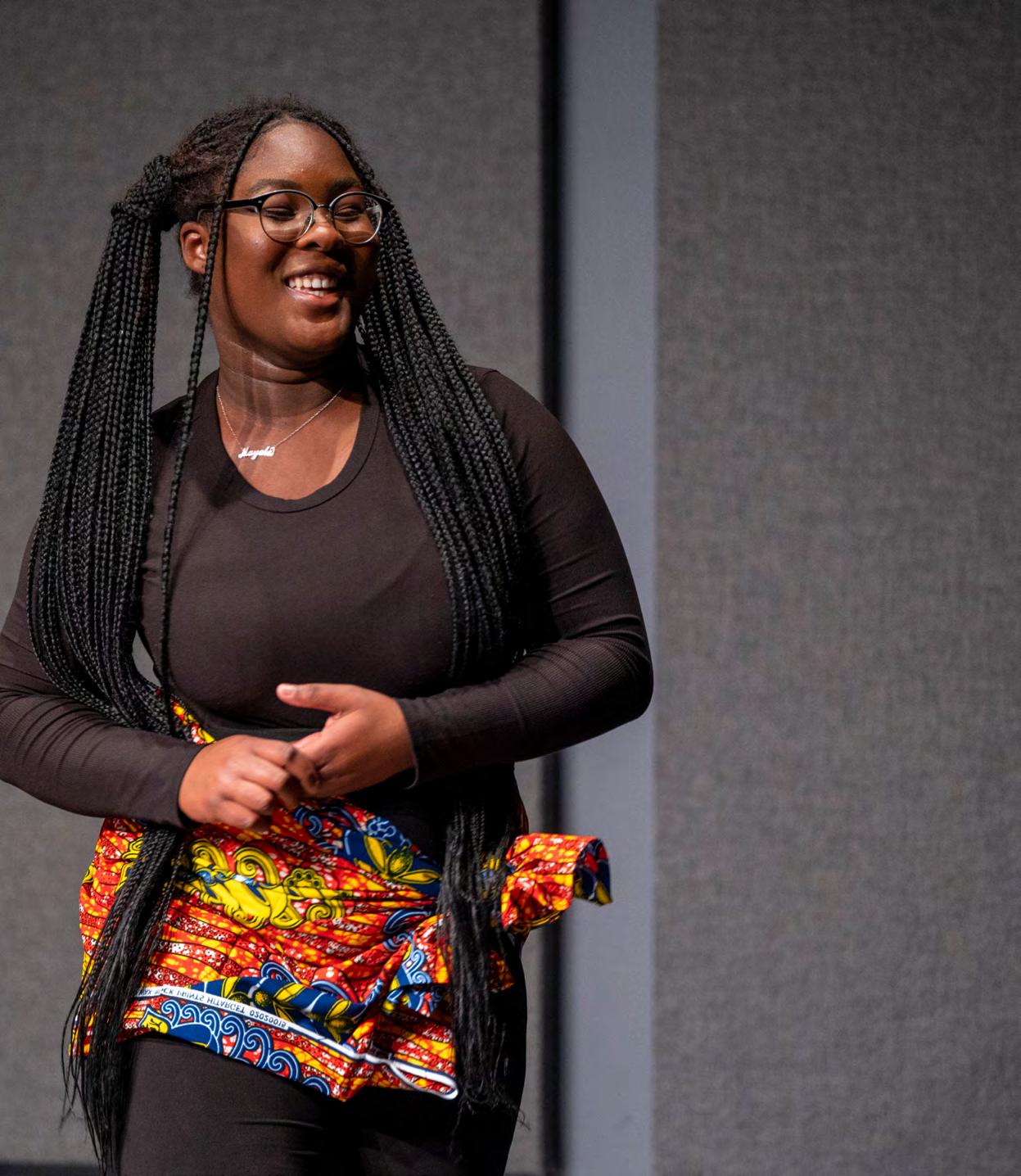
Whenshe graduated with a doctorate in business from the University of Minnesota, Dawn Hukai decided to apply for a job teaching at the University of Wisconsin-River Falls despite the fact she knew little about the university.
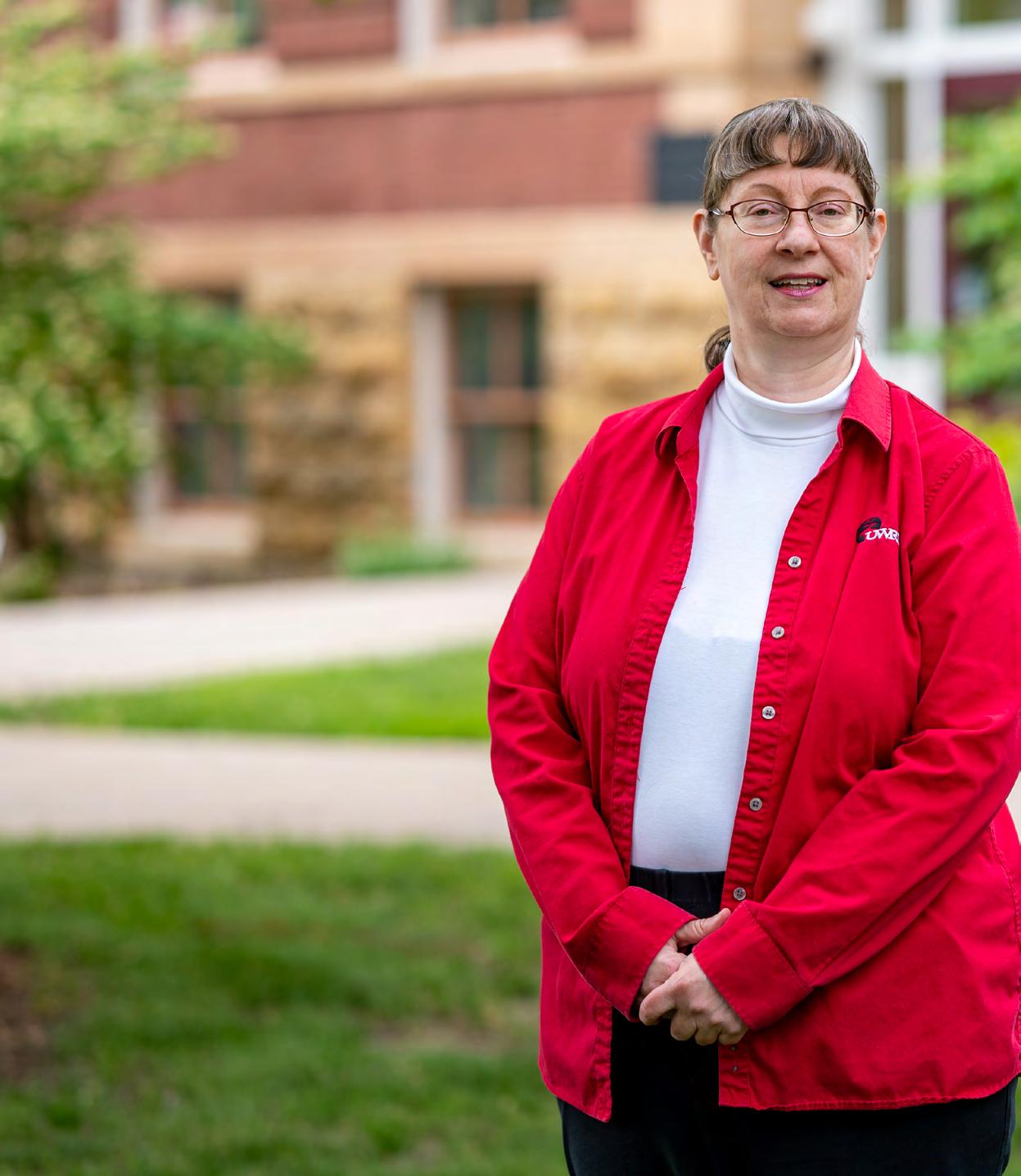
“I wasn’t even sure where UW-River Falls was,” Hukai recalled, noting she anticipated it being much further from the Twin Cities. “A connection in my graduate school program told me about the position, and I decided to go for it.”
During her in-person visit to UWRF as part of the interview process, Hukai was smitten with the university. She enjoyed the vibe of the relatively small-but-scenic campus and the quaint “main street” feel of the surrounding city. When she crossed a street, she was pleasantly surprised that motorists stopped for her. Faculty members and students greeted her in a friendly manner.
“I just fell in love with the place,” Hukai said. “It had a small-town feel, it felt safe and friendly. The people were so welcoming to me. People at UWRF seemed happy to be working together. That really stuck with me.”
Hukai was offered a job teaching accounting and accepted it. Twenty-five years later she is still at the university, having not only taught many students but serving in multiple administrative roles and helping oversee numerous changes to boost student success.
Shortly after starting her career at UWRF, Hukai worked to help the College of Business and Economics (CBE) gain accreditation. After accomplishing other administrative work, she was named associate dean of that college in 2009. In January 2022, she was named acting dean of CBE and six months later became interim dean of CBE and the College of Education and Professional Studies.
“I never planned to get into administration,” Hukai said. “It was very much happenstance. I always look at it as if I can help students by doing this, why wouldn’t I do that?”
Despite her busy administrator schedule, Hukai continues to teach students. She discovered her affinity for working with them during her graduate school days. She had planned to focus on research, but she discovered that working with students was “what I really loved.” That realization prompted Hukai to spend her career at a teaching institution rather than one focused on research. She wanted to work at a school like UWRF, a place committed to student learning.
“I came (to UWRF) hoping that I would be able to stay and make a career of it, to try to make a positive difference for students,” Hukai said. “I can’t imagine it having worked out any better for me.”
Los Angeles native Sam Anzai, a four-year member of the UWRiver Falls men’s hockey team, spent years playing junior hockey all over the map from Canada to Pennsylvania, but it wasn’t until he stepped on campus that he felt he found his new home in River Falls. Recruited to UWRF as a hockey player, he went on many visits but the community aspect in River Falls made a difference.
“Right away I felt very comfortable with everyone from the guys on the team and all the staff at the Falcon Center,” Anzai said. “Everybody I met was very kind and took their time to make me feel comfortable.”
Four years later and Anzai has missed just three games throughout his hockey career while developing into a leader on and off the ice. A hockey team captain, he received a degree in spring 2023 in neuroscience and biomedical and health science and capped off his undergraduate career as one of seven students to receive the Chancellor’s Award, the highest non-academic honor students can receive at the university. The award
recognizes students who have shown distinguished leadership and service while on campus. He’s served as a member of the Student Athlete Advisory Committee, Falcon Athletics Five-Year Strategic Planning Committee, and the Faculty Senate Athletics Committee.
A regular on the Dean’s List while graduating with a 3.98 cumulative GPA, Anzai is well respected by his teammates, coaches, and fellow Falcon student-athletes, receiving accolades such as his team’s Student-Athlete of the Year, UWRF Male Scholar Athlete of the Year, and the Falcon Fly High Award.
“That’s cool recognition for sure. I want to be a role model and for others to see you can be successful in hockey and academics. The Scholar Athlete Award is probably the most meaningful to me because there are so many other studentathletes that were deserving of it,” Anzai humbly said.
Sam has found a home in River Falls, and “every summer I come back saying I get more excited to

come back,” he said, so he decided to stay for more.
Anzai is slated to return to UWRF for another year, planning to use his fifth year of athletic eligibility in 2023-24, granted after the shortened 2020 scheduled due to COVID-19 while pursuing a master’s degree in clinical exercise physiology.
“All the people in River Falls have become a part of my life, staff, coaches, other athletes,” he said.
“It’s the little things like people saying ‘hi’ on the street. The community and how tight-knitted it is, I’ve never experienced anything like it. I’ve been able to carve out a career path and my education and overall knowledge has really expanded, which has been one of the things I’m most grateful for coming to River Falls. There are a lot of things that made my experience for four years awesome.”
 Sam Anzai
Sam Anzai
Emily Evans arrived at the University of Wisconsin-River Falls focused on playing softball, and her love for that sport and an affinity for educating students that was sparked while she attended UWRF has taken her around the world.
For the past two years, Evans, ‘07, has worked for a sports and education organization, teaching elementary school students while also coaching high school girls and young women to play softball in North Africa. Before that she played softball in Asia and coached the sport in Asia and Africa.
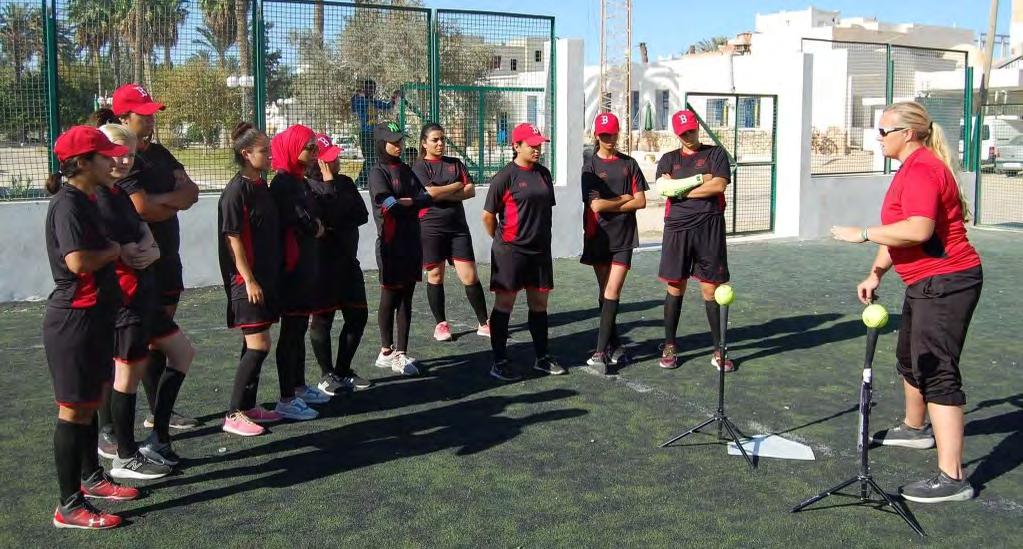
Given that Evans didn’t know what she wanted to do for a profession when she started college and that she switched majors several times, her work with children and women halfway around the world is a surprise to even herself.
“I never saw this for myself,” Evans said. “I’m a completely different person now than I was. I had to go through some things, figure out who I am and what I want to do.”
Evans started figuring out her
future at UWRF. She found a sense of belonging through her softball teammates and other athletes in her residence hall. Finding her place academically took a bit longer, she said. She considered several careers before she began coaching summer softball and realized she enjoyed working with children. She graduated from UWRF with an exercise science degree and subsequently got her teaching certification at Concordia University in St. Paul.
After obtaining her teaching license, Evans taught physical education, then third and fifth grades at a St. Paul elementary school. She also taught middle school math and science and high school physical education at Lionsgate Academy in Shoreview, Minn., a school that specializes in educating students on the autism spectrum. Several years ago, she learned about an opportunity to teach and coach softball in North Africa. She took it.
Evans was already working to develop that country’s national softball program, so the move to teach there made sense. The school
she teaches at includes students from various nationalities, given that many of their parents work at embassies of various nations, including the U.S. Whenever she returns to the U.S., Evans does fundraising and brings athletic gear back to North Africa to give to students there.
Whether teaching in the classroom or building a softball team, Evans said she admires the work ethic and tenacity of the students and softball players she works with. Since her first trip teaching softball in Asia years ago, Evans has been hooked on educating overseas. She is especially heartened to coach female softball players there who have few resources and live in a male-dominated society. She also is coaching flag football for middle and high schoolers, students who had not previously experienced American football.
“I want to offer girls in this part of the world opportunities that they would not usually have, to help empower them,” she said. “I truly feel like doing that work is my place in this world.”
UWRF will reintroduce baseball and add men’s soccer as varsity sports beginning in the 2024-25 academic year and if everything goes as planned, the new sports will bring new students.
“Men’s soccer and baseball will attract prospective students who are passionate about these sports, and that may influence their decision to choose UWRF over other universities,” Chancellor Maria Gallo said. “And as we know, students involved in sports strongly connect to the university and are more likely to stay engaged, thereby increasing retention. It is a winwin.”
UWRF Athletic Director Crystal Lanning said adding baseball and men’s soccer “are natural next steps” for Falcon Athletics. She said those programs will support the university’s strategic enrollment goals by attracting new student-athletes.
“Baseball has a long tradition at UWRF, and I am excited for the opportunity to bring Falcon baseball back to the River Falls community,” Lanning said. “Additionally, men’s soccer has a strong base in the Twin Cities and Midwest region, and we are well positioned to build a highly competitive program.”
Adding sports teams to attract student-athletes has a track record of success in recent years at UWRF. The university added women’s lacrosse in 2017 and Esports in 2022. Both of those teams have brought additional students to campus, Lanning said.
UWRF had a baseball team before it was discontinued in 2002. As a sign of interest in reviving the program, the university has been home to a club baseball team since 2017. Men’s soccer is a new varsity sport at UWRF.

The addition of baseball and men’s soccer expanded the university’s roster of varsity intercollegiate program total to 20.

UWRF will be the eighth school in the Wisconsin Intercollegiate Athletic Conference to sponsor baseball and the fifth to sponsor men’s soccer.

Steve Bartlein has been named head baseball coach at UWRF and will lead the team as it returns as a varsity sport for the 2024-25 academic year after a 21-year absence.
Bartlein has a history of success as both a player and a coach in the WIAC. Since 2017, Bartlein was an assistant coach at UW-Whitewater. During his six seasons there, UW-W won four conference championships and made four NCAA regional appearances.
As a member of the UW-W baseball team from 2010-13, Bartlein was a twoyear starting infielder and was named a first-team all-conference player in 2013.


Family, friends and teammates of Jim Brindley, ’71, who played for some of the earliest teams in UWRF hockey history, gathered at Hunt Arena on August 19 to honor the former Falcon who died in December 2022. Teammate Jack Norqual, ’68, second from left, provided a financial gift to UWRF men’s hockey in Brindley’s memory and presented a memorial plaque to be permanently displayed in the Paul Dykstra Men’s Hockey Locker Room. Falcon Head Coach Steve Freeman,


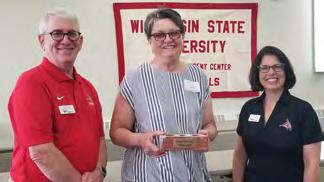


left, accepted the gifts on behalf of the program.


information on how you can obtain a Hagestad brick, email at pedro.renta@uwrf.edu.

1970s
Steven Hesprich, ’73, has been promoted to IT special projects manager at UW-Green Bay. Green Bay.
1980s
Dale Henderson, ’82, was appointed director of the waste and recycling division by the Polk County Commission. Wellington, Fla.
Jeff Whitney, ’83, was inducted into the Minnesota Hockey Coaches Association Hall of Fame. Rochester, Minn.
Pam Jahnke, ’85, was inducted into the National Association of Farm Broadcasting Hall of Fame. Madison.
Camille Madison, ’85, is a financial specialist at UWRiver Falls. River Falls.
Richard Mack, ’87, is a school counselor in the Los Angeles Unified School District. Los Angeles, Calif.
Cary Sifferath, ’88, has been promoted to vice president at the U.S. Grains Council. Washington D.C.
Bill Halfman, ’89, is the beef outreach specialist with UW-Madison Extension. Madison.
Renee Alexander, ’90, has been promoted to chief executive officer of the Minnesota State Fair. Falcon Heights, Minn.
Kevin Bullis, ’92, has retired as head football coach at UW-Whitewater. Whitewater.
Brian Ingemann, ’95, accepted a one-year interim appointment as principal at Ridgeview Elementary School. Plymouth, Minn.
Craig Sarnow, ’96, was promoted to inspector
with the Milwaukee Police Department. Milwaukee
Eric Schneider, ’96, is the agronomy business development lead at Northside Elevator. Stanley.
Eric Atkinson, ’97, is the city administrator for the City of Menomonie. Menomonie.
Angela Clifton, ’98, was inducted into the Simley High School (Minn.) Hall of Fame. Inver Grove Heights, Minn.
Brian Kuhl, ’99, was named 2023 “Leader in the Field” for contributions to agriculture safety and health practice. Hudson.
Rick Montreal, ’99, is the dean of students at Prescott High School. Prescott.
Cara Dempski, ’00, is the sports editor at the Courier Press. Prairie du Chien.
Jason Liegl, ’01, is a math teacher in the New London School District. New London, Minn.
Laura King, ’02, is the vice chancellor for strategic enrollment at UW-River Falls. New Richmond.
Terry Schwaller, ’03, received the Excellence in Science Education Award from the Wisconsin Society of Science Teachers. Appleton.
Jackie Byam, ’04, is the Wyoming state conservationist with the U.S. Department of Agriculture’s Natural Resources Conservation Service. Casper, Wyo.
Leslie Svacina, ’04, was appointed to the Wisconsin Technical College System Board by Gov. Tony Evers. Deer Park.
Charles Conley, ’06, is a business teacher in the River Falls School District.
River Falls
Cynthia Meyer Bourget, ’09, was recently named School Counselor of the Year by the Wisconsin School Counselors Association. Elk Mound.
Aria Wallace, ’16, is a lieutenant junior grade with a specialty in cryptologic warfare with the Department of Defense-United States Navy. Aurora, Colo.
Taylor Norby, ’17, is a medical technologist at VA Healthcare Fargo. Fargo, N.D.
Edward Eichstadt, ’18, is a trader with Spectro Alloys. Rosemount, Minn.
Adam Hartfiel, ’19, is regional livestock educator for Adams, Green Lake and Waushara counties. Appleton.
Nicholas Thorn, ’19, is a clinical care coordinator at Twin Cities Orthopedics. Cottage Grove., Minn.
Ashlynn Kirk, ’20, is the program manager in the Humane Handling Institute at UWRF. River Falls.
Veronica Naranjo Mata, ’20, has been promoted to associate manager at Mahoney CPAS and Advisors. St. Paul, Minn.
Corey Berhhammer, ’21, has been named interim superintendent for the Prairie Farm School District. Clayton.
Kayla Hokenstad, ’21, is the associate principal at Shawano Middle School. Shawano.
Travis Koester, ’21, has been promoted to senior associate at Mahoney CPAS and Advisors. St. Paul, Minn.
Melissa Thorud, ’21, is the community news editor for the (Red Wing) Republican Eagle. St. Paul, Minn.
Now, more than ever, UW-River Falls needs your support through a contribution to the Falcon Annual Fund
The Falcon Annual Fund is the university’s unrestricted funding resource which helps UWRF meet its most pressing and immediate needs. Your investment, which makes an immediate impact, helps provide our students with living and learning experiences that lead to bright future; futures filled with limitless opportunities.
Follow this link to make your online gift in support of the Falcon Annual Fund today: https://www.uwrf.edu/ universityadvancement/give.cfm
You can mail your check, payable to the UWRF Foundation, to:
UWRF Foundation
ATTN: Falcon Annual Fund 410 S. 3rd Street River Falls, WI 54022
Thanks for your help moving the Falcons forward!
Find out the latest news from your classmates — career changes, recent honors, retirements and more.

Send us your latest news and we will print it in the next issue.
Here’s how:
1) email falconfeatures@uwrf.edu or
2) submit a form at uwrf.edu/alumni/ and click Update Information.
In the interest of accuracy, encourage classmates to send us their news directly—don’t do it for them.
We will not print a death announcement unless accompanied by a copy of a published obituary (such as an announcement from a local newspaper).
Questions about Alma Matters may be directed to Kjisa Munsen at 715-425-3505 or kjisa. munson@uwrf.edu
1940s
Grace Tresselt Paulson, ‘42, Oct. 11, 2022.
Margaret Pepper Timmerman, ‘43,’76, Sept. 3, 2022.
Deloise Trindle Baker, ‘46, Jan. 13, 2023.
Emily Wahlquist Williams, ‘47, May 18, 2023.
Marjorie Gilstad Gibbs, ‘48, Dec. 16, 2022.
Evelyn Bjornstad Asmus, ‘49, Oct. 12, 2022.
Norman Pautz, ‘49, Jan. 17, 2023.
Janice Radkey Saueressig, ‘49, Jan. 7, 2023.
Christine Thompson Tschudy, ‘49, June 12, 2023.
1950s
Ruth Lokhorst Klanderman, ‘50, July 14, 2022.
Phyllis Wienberg Paulson, ‘50, July 31, 2022.
Herbert Afdahl, ‘51, April 1, 2023.
Robert Houg, ‘51, Dec. 23, 2022.
Richard Vilstrup, ‘51, Dec. 6, 2022.
Leroy Young, ‘51, April 20, 2023.
Irene Tiller Dietsche, ‘52, July 19, 2022.
Helen Peterson Jarchow, ‘52, Jan. 19, 2023.
J. David Johnson, ‘53, Jan. 30, 2023.
Merlee Bartz Holman Johnson, ‘53, Feb. 3, 2023.
Elayne Meyer Donahue, ‘54, May 1, 2023.
Cleo Nelson Frye, ‘54, Jan. 16, 2023.
Donna Sammons Tilly, ‘54, May 29, 2023.
Janice Moen Holten, ‘54, ‘67, July 18, 2022.
Viola Krengel BristolJohnson, ‘55, Sept. 23, 2022.
Norris Erickson, ‘55, Feb. 20, 2022.
Robert Koenig, ‘55, June 29, 2023.
Paul Forsythe, ‘56, Jan. 25, 2023.
Janis Olufson Grilley, ‘56, April 16, 2023.
Gerald Brynildson, ‘57, May 23, 2023.
John Herpst, ‘57, Feb. 21, 2023.
Donald Laue, ‘57, Aug. 21, 2022.
Donald McLellan, ‘57, Feb. 2, 2023.
Steve Telisak, ‘57, Dec. 7, 2022.
James Armbruster, ‘58, Dec. 27, 2022.
Merle Bergren, ‘58, Aug. 12, 2022.
Daniel Michaelson, ‘58, Feb. 16, 2023.
Lois Eaton Waller, ‘58, Feb. 26, 2023.
Phyllis Anderson Bastian, ‘59, March 29, 2022.
Albert Becker, ‘59, Jan. 12, 2023.
Marlin Feld, ‘59, March 20, 2023.
Edward Koca, ‘59, Nov. 27, 2022.
Gary Madson, ‘59, Nov. 6, 2022.
Thomas Trainor, ‘59, Oct. 13, 2022.
1960s
Henry Bollum, ‘60, Dec. 21, 2022.
John Gregorich, ‘60, Dec. 6, 2022.
Charles Johansen, ‘60, Feb. 12, 2023.
Wilbur Larson, ‘60, June 29, 2022.
Leigh Marquardt, ‘60, Aug. 30, 2022.
Gordon Nelson, ‘60, Oct. 10, 2022.
Darrell Skoug, ‘60, June 23, 2023.
Orlan Youngren, ‘60, Oct. 17, 2022.
David Ankley, ‘61, Aug. 9, 2022.
Marlene Morse Bachim, ‘61, Oct. 13, 2022.
Wayne Beebe, ‘61, Jan. 21, 2023.
Joan Kuechler Hansen, ‘61, June 27, 2023.
Gary Kahl, ‘61, June 29, 2023.
Timothy Olson, ‘61, April 24, 2023.
Danny Porfilio, ‘61, Sept. 1, 2022.
Jerome Schmidt, ‘61, Jan. 19, 2023.
Hugo Wiebusch, ‘61, March 10, 2023.
Edward Erickson, ‘62, Jan. 11, 2023.
Daniel Hubin, ‘62, Aug. 31, 2022.
Robert Kulzer, ‘62, May 2, 2023.
Mildred Gustafson Mehrkens, ‘62, Aug. 12, 2022.
Mary Viitanen Mundl, ‘62, Dec. 7, 2022.
Jean McMillan Pierre, ‘62, March 31, 2023.
James Schwenk, ‘62, July 12, 2022.
Constance Crownhart, ‘63, Dec. 17, 2022.
Jene Everson, ‘63, Oct. 18, 2022.
Richard Garley, ‘63, May 31, 2023.
Roger Swanson, ‘63, Jan. 2, 2023.
James Ticknor, ‘63, Oct. 31, 2022.
Weldon Weyenberg, ‘63, Feb. 5, 2023.
Larry Anderson, ‘64, Aug. 15, 2022.
Carol Peterson Heimstead, ‘64, Aug. 2, 2022.
Howard Petersen, ‘64, April 11, 2023.
Lowell Roehl, ‘64, March 4, 2023.
Joe Duckett, ‘65, June 15, 2023.
Wayland Forehand, Jr., ‘65, Jan. 22, 2023.
Arlene Gustafson Freewalt, ‘66, Sept. 22, 2022.
John Gilbert, ‘66, Nov. 10, 2022.
Thomas Hetzel, ‘66, Dec. 9, 2022.
Duane Hubing, ‘66, June 27, 2022.
David Koshalek, ‘66, June 19, 2023.
Douglas Lansing, ‘66, July 10, 2022.
Thomas Olson, ‘66, May 25, 2023.
John Shiffler, ‘66, June 20, 2023.
Victoria Szczech Culver Price, ‘66, April 19, 2023.
Rolland Rieck, ‘66, Sept. 1, 2022.
Nancy Larson Nimtz,’66, ‘76, April 18, 2023.
Robert Wilman, ‘66, June 24, 2023.
LuVerne Anderson, ‘67, Dec. 9, 2022.
James Brickner, ‘67, July 7, 2022.
Clarence Giloy, ‘67, Oct. 13, 2022.
Dennis Holen, ‘67, Oct. 27, 2022.
Terry Kolpack, ‘67, June 28, 2023.
James Mitchell, ‘67, Feb. 17, 2023.
Ronald Verlare, ‘67, April 22, 2023.
Daniel Anderson, ‘68, Feb. 5, 2023.
James Bitney, ‘68, Oct. 29, 2022.
Ron Johnson, ‘68, Feb. 9, 2022.
Douglas Berkner, ‘69, Aug. 23, 2022.
Sandra Campbell Birkel, ‘69, June 5, 2023.
Glen Denk, ‘69, May 17, 2023.
Carol Bethke Farlow, ‘69, July 23, 2022.
Raymond Johnson, ‘69, Oct. 29, 2022.
Frederick Meyer, ‘69, March 4, 2023.
Sylvia Sandvig, ‘69, July 13, 2022.
Jerry Cognetta, ‘70, Aug. 1, 2022.
Gary Emerson, ‘70, Oct. 28, 2022.
Lari Hoffman, ‘70, Nov. 12, 2022.
Mary Lou Olson, ‘70, July 28, 2022.
George Blomberg, ‘71, Dec. 21, 2022.
James Brindley, ‘71, Dec. 22, 2022.
Luther Grohn, ‘71, May 2, 2023.
Clifford Kahl, ‘71, June 13, 2023.
Marjorie Kleibacker, ‘71, June 3, 2023.
William Pippenger,’ 71, Aug. 17, 2022.
Allan Richter, ‘71, July 15, 2022.
Alberta Seierstad, ‘71, Aug. 5, 2022.
Sandra Stone, ‘71, Nov. 23, 2022.
Virginia Henneman Dolesy, ‘72, July 20, 2022.
Dennis Erstad, ‘72, May 1, 2023.
Errol Gooding, ‘72, June 26, 2023.
Vincent Hanneman, ‘72, Dec. 25, 2022.
Susan Osgood Kay, ‘72, June 3, 2023.
Michael Lind, ‘73, Dec. 7, 2022.
Trudy Herald Loney, ‘73, Dec. 26, 2022.
Marshall Behling, ‘74, Sept. 19, 2022.
Dennis Gottschalk, ‘74, June 17, 2023.
Dennis Hall, ‘74, Sept. 27, 2022.
John Langlois, ‘74, Jan. 14, 2023.
Dennis Mudlitz, ‘74, Oct. 23, 2022.
Loren Hanson, ‘75, Jan. 29, 2023.
Sigurd Hanson, ‘75, Jan. 6, 2023.
Ronald Lehr, ‘75, Nov. 8, 2022.
Jeanette Garvey, ‘76, Nov. 15, 2022.
William Kautza, ‘76, July 12, 2022.
John Leroux, ‘76, March 5, 2023.
Shirley Lipsky, ‘76, March 28, 2023.
Kenneth Oman, ‘76, July 9, 2022.
Dianna Wright Fehlen, ‘77, Sept. 1, 2022.
Mary Kirsch Goldsmith, ‘77, Jan. 8, 2023.
Mark Kjeseth, ‘77, April 17, 2023.
Shirley Pohl Bestler, ‘78, May 24, 2023.
David Beutel, ‘78, ‘83, June 25, 2023.
Randall Brock, ‘78, Dec. 19, 2022.
Richard Mielke, ‘78, Feb. 21, 2023.
Tamara Cherney, ‘79, Jan. 15, 2023.
Lee Isaacson, ‘79, Jan. 27, 2023.
Andrea Bergervoet Pieper Olson, ‘79, May 11, 2023.
Daniel Strehlo, ‘79, March 7, 2022.
Dan Zimmerman, ‘79, Nov. 13, 2022.
Todd Brictson, ‘80, April 6, 2023.
Cynthia Donnelly, ‘80, May 15, 2023.
Gail Walsh Pederson Casey, ‘81, May 20, 2023.
Gregory Dickerman, ‘81, Oct. 31, 2022.
Randall Sanford, ‘81, Oct. 27, 2022.
Gordon Waddington, ‘81, Dec. 11, 2022.
Dennis Hinrichsen, ‘82, June 24, 2023.
William Munns, ‘82, Jan. 5, 2023.
Eileen Opatz Berger, ‘83, Jan. 9, 2023.
Lorne Brusletten, ‘83, Nov. 28, 2022.
Samuel Yakey, ‘83, March 28, 2023.
Karen Nelson, ‘84, April 8, 2023.
Carol Amdahl Wilson, ‘84, March 10, 2023.
Carol Hanson Poff, ‘85, Oct. 5, 2022.
Linda Sutherland, ‘86, Jan. 22, 2023.
Michael Pohl, ‘87, June 5, 2023.
Richard Buck, ‘88, Dec. 1, 2022.
Dean Orr, ‘88, May 8, 2023.
Marc Bangsberg, ‘89, Oct. 5, 2022.
Mark Zimmerman, ‘89, June 29, 2022.
Steven Flood, ‘90, Sept. 27, 2022.
Daniel Rosenbush, ‘90, April 19, 2023.
Mark Bates, ‘91, Feb. 14, 2023.
Nancy Johnson, ‘91, April 27, 2023.
Kevin Lundquist, ‘91, March 3, 2023.
Susan Vandenbrook Suehs, ‘91, Feb. 19, 2023.
Gwendolyn Geraets, ‘92, May 27, 2023.
Scott Anderson, ‘93, March 11, 2023.
Paula Frank, ‘93, Oct. 23, 2022.
Mary Graf Howatt, ‘93, March 17, 2023.
Louise Kooiker, ‘93, May 19, 2023.
Rhonda Haima Schwark, ‘93, Aug. 10, 2022.
Patricia McConville, ‘94, May 6, 2023.
Barbara Lewerer, ‘95, Jan. 18, 2023.
Timothy Krawford, ‘95, Oct. 2, 2022.

Craig Arendt, ‘96, Oct. 16, 2022.
Craig Arendt, ‘96, Oct. 16, 2022.
Paul Kidder, ‘96, June 11, 2023.
Brian Savage, ‘96, May 27, 2022.
Robert Carrier, ‘98, June 9, 2023.
Chris Parsons, ‘98, June 15, 2023.
Randall Tilch, ‘98, Dec. 26, 2022.
2000s
Nancy Brost, ‘00, April 29, 2023.
Ross Walhof, ‘00, Jan. 27, 2023.
Brett Carlson, ‘01, Nov. 26, 2022.
Roberta Bradford, ‘02, May 13, 2023.
Dahm Cameron, ‘03, Aug. 10, 2022.
Stephen Miller, ‘03, Feb. 22, 2023.
Roger Parenteau, ‘06, Oct. 11, 2022.

Bryan Hop, ‘08, May 18, 2023.
2010s
Robin Nelson, ‘11, Sept. 25, 2022.
John Feia, ‘12, Jan. 9, 2023.
Mackenzie Clague Buckentine, ‘15, Aug. 4, 2022.
Eva Schrank, ‘22, Sept. 6, 2022.
Laura Schrankler, ‘22, July 19, 2022.
Clair Bernhardt “Bernie” Brohaugh, 84, died July 4, 2023. Brohaugh graduated from UW-River Falls in 1961 with a major in English and a minor in French. From there, he attended the University of Nebraska, Lincoln earning a M.A. and Ph.D. in English. In 1977, Brohaugh returned to UWRF to teach in the English Department and taught for 28 years until his retirement. In addition to an English professor, Brohaugh was an actor and playwright. He was a passionate teacher and Shakespeare scholar who was dedicated to educating and assisting his students. He enjoyed acting in theater productions in the River Falls area. Brohaugh also sang in Barbershop quartets and choruses for decades and wrote shows and arranged music for their performances.
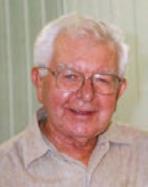
Brohaugh’s obituary is at https://bakken-young. com/?s=brohaugh&id=18364
Sigurd Conrad Hanson, 70, died Jan. 6, 2023. He attended Holmen High School and UWRF, where he earned a degree in agricultural business and journalism. Years later, he received the Distinguished Alumnus Award from both Holmen and UWRF. Hanson taught high school agriculture for one year in Wild Rose. A natural-born leader, he then attended the School for International Training in Brattleboro, Vt., which led to decades of service in third-world countries through non-governmental organizations. He once said of his life’s work: “The main point, I believe, is to never give up. It’s natural to feel powerless … but it does not stop me from carrying on the fight for equality and justice, from hearing the voices of the ordinary people.”
Hanson’s obituary is at https://www.dickinsonfuneralhome.com/obituaries/ sigurd-c-hanson?obId=26953414
Nancy Parlin, 89, died March 13, 2023. She had a long, outstanding career in higher education at the College of St. Catherine, Minnesota State University Moorhead and UWRiver Falls, where she served as a sociology professor and vice chancellor for academic affairs –the first woman to hold the position. Parlin served in the Peace Corps and was active in the civil rights movement. She continued to work for peace, social justice and human rights throughout her life. Her generous spirit was demonstrated in hosting many gatherings at her home and lake cabin, as well as supporting young people in their pursuit of higher education. Parlin created a scholarship to benefit UWRF students, the Parlin Social Justice Endowed Scholarship. Contributions to the fund may be directed to the UWRF Foundation.
Parlin’s obituary is at https://oconnellfuneralhomes. com/obituaries/nancy-parlin/


Wilbur William “Bill” Sperling, 96, died May 25, 2023. Sperling started his career as a high school teacher and coach. He went on to reach the pinnacle of success in the business world, then completed his doctorate at UWMadison before coming to UWRF, where he worked in Admissions and became the university’s first director of Alumni Relations. He ended his UWRF career as special assistant to the chancellor. Sperling was best known in River Falls as the public address “voice of the Falcons,” announcing football, basketball and hockey games for more than three decades. For his service, Sperling was inducted into the UWRF Athletic Hall of Fame in 1995. Sperling will be remembered for his engaging personality and amazing work ethic, always living his motto: “Never settle for less than your best!”
Sperling’s obituary is at https://www.tributearchive. com/obituaries/28042336/wilbur-william-sperling/ webster/wisconsin/swedberg-taylor-funeralhomes-cremation-services---webster
• It costs you nothing today to make a bequest.
• A bequest is free of federal estate tax.
• Your bequest can be changed down the road.
• You can still benefit your heirs with specific gifts.
• A bequest may produce estate tax savings.
• You can leave a legacy through a bequest.
Margaret Keating
For more than three decades, Margaret Keating, ’75, business and economics, built a remarkable record of achievement at Hallmark. She started in 1979 as a process controller. She held various positions of increasing responsibility in operations, including scheduling manager, manager of graphic arts, graphic arts human resources director and director of graphic arts. In April 1994, she was promoted to the vice president of the Graphic Arts Department and named a corporate officer by the Board of Directors.
Keating, originally from New Richmond, retired from Hallmark in 2010 as the group vice president of operations. She was responsible for all United States and Canadian manufacturing, distribution, transportation, graphic arts and global procurement for the entire Hallmark family of companies with buying offices in Hong Kong, Bangkok, and Shanghai.
Keating was an adjunct professor within the Henry W. Bloch School of Management at the University of Missouri – Kansas City (UMKC) where she taught supply chain curriculum. Previous board memberships include the University of Missouri - Kansas City Bloch Advisory Council, United Way of Greater Kansas City Women’s Leadership Council, Girl Scouts of Mid-Continent, and the University of Michigan - Ross School of Business, the Master of Supply Chain Management Corporate Advisory Council and the UW-River Falls Foundation Board of Directors.
Keating serves on the board of Outreach International, a global nonprofit that supports local leaders and community-led groups who develop lasting solutions to poverty-related issues.
She and her husband live in Raymore, Miss. Keating enjoys spending time with her two children and five grandchildren.

Chaplain Richmond
E. Stoglin, ‘79, Arlington, Texas, has a career of exceptional service to his country and his community.
Stoglin served his country in the United States Navy Reserve Chaplain Corps from 1985 to 2013. During his service career, he attained the rank of commander and former regimental chaplain to the 14th Marines, the largest artillery command in the U.S. Marine Corps. He also served as command chaplain of the NATO Training Mission-Afghanistan and the Combined Security Training Command-Afghanistan.
Stoglin served for more than 22 years for the U.S. Department of Justice, Federal Bureau of Prisons, Federal Medical Center in Fort Worth, Texas. His last position within the Department of Justice was as department head of religious services.
After retiring, Stoglin started his own consulting group, The Stoglin Group. The firm specializes in consulting organizations, corporations and nonprofits through mediation, family
mediation, workplace ethics, strategic planning, leadership development, public policy and law enforcement counseling.
A decorated veteran, Stoglin’s accolades include a Defense Meritorious Service Medal, a Meritorious Service Medal and two National Defense service medals. He’s been a recipient of the Fort Worth Metropolitan Black Chamber of Commerce MVP award and was named the University of TexasArlington’s Outstanding African American Alumnus. He graduated from the Naval War College in June 2012.
Stoglin was the first African American to be ordained in the Minnesota United Methodist Conference in 1981. In January, he became the first African American ordained to the priesthood in the Fort Worth Anglican Diocese of the American Church of North America (ACNA).
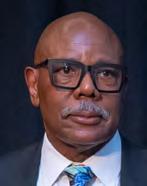
Stoglin enjoys walking, reading, public speaking and volunteering for multiple charitable causes. He is also a published author. He lives in Arlington with his wife, Reecia.
Ali Kofiro is the first Somali student accepted in the UWRF school of counseling program. After earning his master’s degree from UWRF in 2010, he went on to become the first Somali licensed school counselor in the region and possibly the nation.
Recognizing a need and opportunity to have more diversity in counseling, Kofiro became a tireless advocate, encouraging members of the Somali community to explore counseling as a career. As a result of Kofiro’s efforts, there are now 16 licensed Somali school counselors in Minnesota.

Several moving on to become principals.
Kofiro has often returned to UWRF to teach classes and is a leading member of the counseling program’s stakeholders group.
Kofiro has been a school counselor at Wellstone International High School in Minneapolis since 2011. He is also the founder and president of Disability Benefit Solutions. A firm specializing in representing people with disabilities who need to apply for social security benefits. He has helped thousands of disability claims across the nation.
In 2015, Kofiro was recognized as UWRF College of Education and Professional Studies Distinguished Alum.
Charles and Ruth Anne White
Stephen “Steve” Swensen’s roots at the University of Wisconsin-River Falls run deep.
As the son of a prominent UW-River Falls leader and professor and one of six siblings who all attended the university, Steve’s connection already was strong before he met his future wife, Lynn, in his freshman calculus class in fall 1974.
Steve sat in the front row, and Lynn sat a row behind him.
Charles and Ruth Anne White are longtime community supporters of UW-River Falls people, programs and projects.

While attending UWRF for one year, Chuck starred on the debate team. He then transferred to UW-Madison, received his bachelor’s degree in 1949 and earned his law degree in 1951. He then served in the U.S. Army Judge Advocate General Corps in Korea, where he was awarded the Bronze Star Medal for Korean Service, the Korean Service Medal and the United Nations Service Medal.
Following his service, Chuck returned to his hometown of River Falls and practiced law for 42 years in the community and taught business law at UWRF.
Ruth Anne grew up in Viroqua and earned her bachelor’s degree in accounting from UW-Madison. She had a long career at Niro Atomizer in Hudson which produced evaporation equipment for food, dairy and chemical products.
The Whites have been longtime generous supporters of UWRF, establishing multiple scholarship funds and providing support for major university projects such as the renovation of David Smith Stadium at Ramer Field, the Falcon Center and the Science and Technology Innovation Center (SciTech).
“I spent as much time looking over my shoulder as I did watching the professor,” Steve joked, recalling how three years later he proposed to Lynn on a Japan-America Student Conference trip to Japan.
They were married six months before graduating in 1978, sealing their love for each other and their bond with the institution that brought them together.
During the 2022-23 academic year, the Swensens elected to express their appreciation to UWRiver Falls through a major gift to the Science and Technology Innovation Center planned on campus. The SciTech project, scheduled to have its groundbreaking ceremony this fall, will offer students and faculty a transformational teaching and learning environment and support collaborations with regional and Wisconsin businesses.
“From the moment Steve and Lynn heard details about SciTech, it was clear they understood the vital importance of the project and the impact it will have on generations of Falcons,” said Rick Foy, assistant chancellor for university advancement. “Their generous gift is even more meaningful because of the Swensen family’s long and deep relationship with UW-River Falls. We’re incredibly grateful for their support and the legacy they’ve established.”
In recognition of their donation, the Swensens will have a SciTech chemistry lab named in their honor.
“This is our way of saying thank you for all that UW-River Falls and the River Falls community have done for us,” Steve said. “Donating to a chemistry lab just fit with part of what we are grateful for — our love of learning and the spirit of inquiry that started at UW-River Falls.”
The gift also was a nod to Steve’s late father, Richard “Dick” Swensen, a chemistry professor at the university before serving as dean of the College of Arts and Sciences.
Steve and Lynn Swensen, now of Rio Verde, Ariz., expressed confidence that the SciTech project will help foster a similar spirit of inquiry in generations of new students at UW-River Falls.

“It’s not just the building itself,” Steve said, “but
what they’re going to do with the building to advance science and technology.”
As a senior fellow for the Institute for Healthcare Improvement and former chief quality officer and director of leadership and organization development at Rochester, Minn.-based Mayo Clinic, Steve has been dedicated to advancing science his entire career. He also served as a full professor specializing in radiology at Mayo Clinic College of Medicine and Science, where he authored three books and 207 articles along with heading up three National Institutes of Health grants totaling more than $10 million that have led to advancements in the early detection, understanding and treatment of cancers and lung disease.
Steve was named a UWRF Distinguished Alum in 2005.
Lynn, an education major at UWRF, helped guide students as a teacher and education administrator at Mayo for 20 years.
UNIVERSITY ADVANCEMENT
112 South Hall 410 S. 3rd St. River Falls, WI 54022
Green Bay Packers vs. New Orleans Saints, Sept. 24, 2023
St. Croix River Boat Cruise, Sept. 28, 2023
Homecoming Weekend, Sept. 29-30, 2023
Hall of Fame, Sept. 30, 2023
Discover Switzerland, Austria and Bavaria Trip, Oct. 11-20, 2023
60 Years of Study Abroad Celebration, Oct. 14, 2023
Sam’s Christmas Village, Dec. 14, 2023
Fall Commencement, Dec. 16, 2023
Kalahari Resort UWRF Special, Feb. 9-11, 2024
WI Day in Sun City Arizona, March 14, 2024
UWRF Night, Minnesota Wild vs. San Jose Sharks, March 28, 2024
The Lion King, Orpheum Theatre, April 24, 2024
Urinetown (musical), UWRF Theatre, April 4, 2024
Evening of Excellence, May 3, 2024
Spring Commencement, May 4, 2024
Alaska Discovery Land and Cruise Trip, July 24-Aug. 4, 2024
Please visit our alumni page for up-to-date events, registration and times. www.uwrf.edu/Alumni/UpcomingEvents.cfm
There’s nothing better than a Falcon gettogether! Want to make your gathering a little more spirited?
Simply let us know ahead of time and we’ll send a little Falcon swag to help you celebrate. When the festivities are over, send us a photo and you just might end up on the UWRF Alumni Facebook page!
facebook.com/uwrfalumniassociation
twitter.com/uwrfalumni
instagram.com/uwrfalumni
For additional event information: Contact University Advancement at 877-258-6647 (toll free), 715-425-3505, alumni@uwrf.edu or visit www.uwrf.edu/alumni